Howard Zinn
description: American historian, playwright, and socialist thinker
88 results
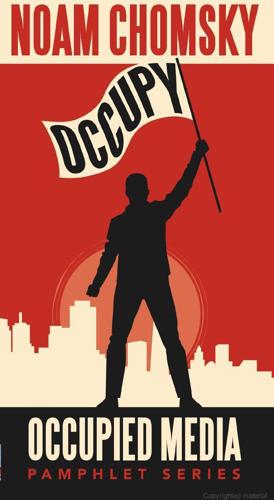
Occupy
by
Noam Chomsky
Published 2 Jan 1994
. †† Bailey McCann, “Cities, states pass resolutions against corporate personhood,” January 4, 2012, CivSource. http://civsourceonline.com/2012/01/04/cities-states-pass-resolutions-against-corporate-personhood/ ‡‡ Emily Ramshaw and Jay Root, “A New Rick Perry Shows Up to GOP Debate,” The Texas Tribune, October 18, 2011. Occupy Howard Zinn Memorial Lecture Occupy Boston, MA, Dewey Square, October 22, 2011 It’s a little hard to give a Howard Zinn memorial lecture at an Occupy meeting. There are mixed feelings, necessarily, that go along with it. First of all, there’s regret that Howard is not here to take part in and invigorate it in his inimitable way, something that would have been the dream of his life.
…
It’s not just Citizens United. It goes back a century. And that’s against the will of about two-thirds of the population. Well, all these things offer plenty of opportunities for discussion, interchange, education, organizing and activism. The opportunities are all there. Remembering Howard Zinn It is not easy for me to write a few words about Howard Zinn, the great American activist and historian. He was a very close friend for forty-five years. The families were very close, too. His wife, Roz, who died of cancer not long before, was also a marvelous person and close friend. Also somber is the realization that a whole generation seems to be disappearing, including several other old friends: Edward Said, Eqbal Ahmed and others, who were not only astute and productive scholars, but also dedicated and courageous militants, always on call when needed—which was constant.
…
Black This publication is a joint project of Adelante Alliance and Essential Information Archived by the Tamiment Collection at New York University eISBN: 978-1-884519-10-9 Occupied Media Pamphlet Series | Zuccotti Park Press 405 61 Street | Brooklyn, New York 11220 www.zuccottiparkpress.com Facebook https://www.facebook.com/ZuccottiParkPres Twitter https://twitter.com/zuccottipress Editor’s Note Occupy After Thirty Years of Class War InterOccupy Occupying Foreign Policy Remembering Howard Zinn Occupy Protest Support About the Author About Zuccotti Park Press and the Occupied Media Pamphlet Series Dedicated to the 6,705 people who have been arrested supporting Occupy to date, from the first 80 arrested marching in New York on September 24, 2011, to the woman arrested in Sacramento on March 6, 2012, for throwing flower petals.* May our numbers swell and increase
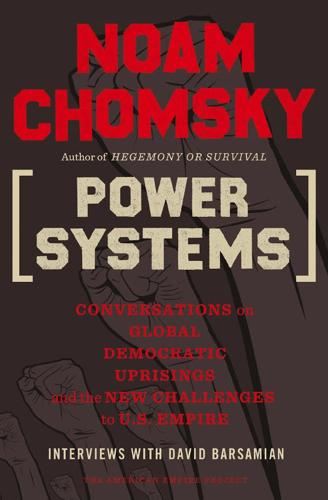
Power Systems: Conversations on Global Democratic Uprisings and the New Challenges to U.S. Empire
by
Noam Chomsky
and
David Barsamian
Published 1 Nov 2012
Immanuel Wallerstein, interview with Sophie Shevardnadze, Russia Today, 4 October 2011. 19. Martin Wolf, “The Big Question Raised by Anti-Capitalist Protests,” Financial Times (London), 28 October 2011. 20. See also Richard Wolff, Democracy at Work (Chicago: Haymarket Books, 2012). 21. Howard Zinn, “A Chorus Against War,” The Progressive 67, no. 3 (March 2003), pp. 19–21. 22. Howard Zinn, “Operation Enduring War,” The Progressive 66, no. 3 (March 2002), pp. 12–13. 23. David Hume, “Of the First Principles of Government,” in Selected Essays, ed. Stephen Copley and Andrew Edgar (New York: Oxford University Press, 1996), p. 24. 24. Edward Bernays, Propaganda (Brooklyn: Ig Publishing, 2005), p. 127. 25.
…
Domestic Disturbances 5. Unconventional Wisdom 6. Mental Slavery 7. Learning How to Discover 8. Aristocrats and Democrats Notes Acknowledgments Index About the Authors 1 The New American Imperialism CAMBRIDGE, MASSACHUSETTS (APRIL 2, 2010) One of the themes that Howard Zinn tried to address during his long career was the lack of historical memory. The facts of history are scrupulously ignored and/or distorted. I was wondering if you could comment on imperialism then and now, interventions then and now. Specifically about Saigon in 1963 and 1964 and Kabul today? What happened in Vietnam in the early 1960s is gone from history.
…
China is now probably the leading trading partner of Brazil. It has surpassed the United States and Europe.50 We were both at a talk that Arundhati Roy gave at Harvard describing the rather extraordinary amount of resistance to neoliberal policies in India.51 There is a tremendous amount of push-back. I wrote to Howard Zinn about her talk. He wrote back to me, in one of the last e-mails I received from him, “Compared to India, the United States seems like a desert.” It wasn’t at one time. If you go back to the nineteenth century, the indigenous population of the United States resisted. In this respect, the United States is a desert because we exterminated the native people.
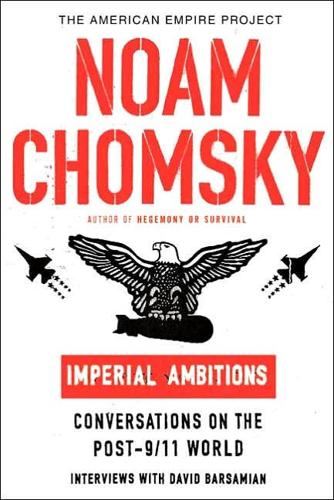
Imperial Ambitions: Conversations on the Post-9/11 World
by
Noam Chomsky
and
David Barsamian
Published 4 Oct 2005
Take a look at SNCC, the Student Nonviolent Coordinating Committee, which was at the leading edge of the civil rights movement—the people who were really on the line, not the ones who showed up for a demonstration now and then but the ones out there every day, sitting at lunch counters, traveling on freedom buses, getting beaten up or in some cases killed. For the most part, the students in SNCC came from the elite colleges, like the college where Howard Zinn was teaching, Spelman, and where he was kicked out because he supported the students in their efforts.11 Spelman was a black college, but an elite black college. Obviously not all the students in the movement came from privileged backgrounds, but they were certainly a leading part of this struggle.
…
Lord Hutton, “Report of the Inquiry into the Circumstances Surrounding the Death of Dr. David Kelly C.M.G.,” 28 January 2004. 8. Noam Chomsky, Necessary Illusions (South End Press, 1989), p. viii. 9. David Hume, Of the First Principles of Government (Longmanns, Green, and Company, 1882), chap. 1. 10. KidsPost, Washington Post, 12 November 2004. 11. See Howard Zinn, SNCC, updated ed. (South End Press, 2002); and Zinn, You Can’t Be Neutral on a Moving Train, updated ed. (Beacon, 2002). 12. Ralph Atkins et al., Financial Times, 22 November 2004. 13. For details, see Roger Morris, New York Times, 14 March 2003; and Said K. Aburish, Saddam Hussein (Bloomsbury, 2000). 14.
…
A professor of Linguistics and Philosophy at MIT, he is widely credited with having revolutionized modern linguistics. He lives outside Boston, Massachusetts. DAVID BARSAMIAN, founder and director of an award-winning and widely syndicated weekly show, Alternative Radio (www.alternativeradio.org) has authored several books of interviews with leading political thinkers, including Arundhati Roy, Howard Zinn, Edward Said, and especially Noam Chomsky. He lives in Boulder, Colorado. THE AMERICAN EMPIRE PROJECT In an era of unprecedented military strength, leaders of the United States, the global hyperpower, have increasingly embraced imperial ambitions. How did this significant shift in purpose and policy come about?
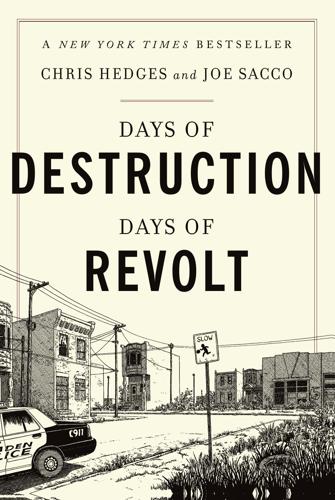
Days of Destruction, Days of Revolt
by
Chris Hedges
and
Joe Sacco
Published 7 Apr 2014
The graphics illustrate what words alone cannot, capturing a past as it’s told, where there’s no longer anything left to photograph.” —Asbury Park Press “[T]he radical disjunction between how Hedges and Sacco approach their subjects is fascinating and instructive. Hedges is at ease with the grand, sweeping Howard Zinn–moments of matchbook history. . . . And if sweeping, historical connect-the-dots is your cup of tea, then you will find Hedges deeply moving. But if, like Sacco, you distrust all history that does not have a face, a name, and a voice behind it, you will find more to call you to action in the voices that speak from the decimated landscapes of America’s deepest poverty, which we (like Dickens’s ‘telescopic philanthropists’) know even less well than we do the sufferings of peoples halfway around the world.
…
The white upper class viewed Europe’s poor, fleeing to America from squalid slums and workhouses, as commodities, fodder for the armies carrying out the genocidal campaigns against Native Americans in the West or cheap labor in the squalid workhouses and mills. Blacks, first imported as slaves, later became part of a disenfranchised underclass. American history, as Howard Zinn illustrated in The People’s History of the United States, has been one long fight by the marginalized and disenfranchised for dignity and freedom. There have been moments when radical movements, especially on the eve of World War I or during the Great Depression, have pushed back to expand opportunities.
…
Proletarian revolutions, however: . . . constantly criticize themselves, constantly interrupt themselves in their own course, return to the apparently accomplished, in order to begin anew; they deride with cruel thoroughness the half-measures, weaknesses, and paltriness of their first attempts, seem to throw down their opponents only so the latter may draw new strength from the earth and rise before them again more gigantic than ever, recoil constantly from the indefinite colossalness of their own goals—until a situation is created which makes all turning back impossible, and the conditions themselves call out: “Hier ist die Rose, hier tanze”30—[“Here is the rose; dance here”]. Ketchup, a petite twenty-two-year-old from Chicago with wavy red hair and bright red-framed glasses, arrived in Zuccotti Park in New York City on September 17, 2011. She had a tent, a rolling suitcase, forty dollars worth of food, the graphic version of Howard Zinn’s A People’s History of the United States, and a sleeping bag. She had no return ticket, no idea what she was undertaking, and no acquaintances among the stragglers who joined her that afternoon to begin the Occupy Wall Street movement. She decided to go to New York after reading the Canadian magazine Adbusters calling for the occupation, although she noted when she got to the park that Adbusters had no discernible presence.
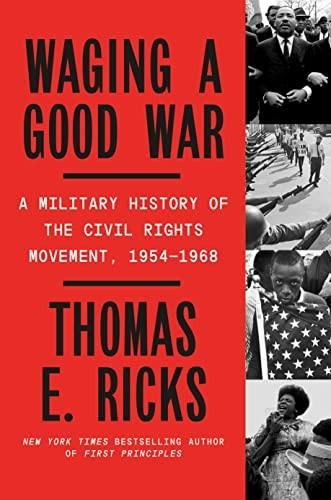
Waging a Good War: A Military History of the Civil Rights Movement, 1954-1968
by
Thomas E. Ricks
Published 3 Oct 2022
“saturation program”: “Minutes of the Meeting of the SNCC Executive Committee, December 27–31, 1963,” 28. “We recognized that the results”: Quoted in William Chafe, The Unfinished Journey: America Since World War II, 5th ed. (Oxford University Press, 2003), 306. Some of those anxious parents: “Jim Forman—November 12, 1965,” interview by Howard Zinn, Zinn Interview Transcripts, 1963–65, Howard Zinn Papers, Freedom Summer Digital Collection, Wisconsin Historical Society, content.wisconsinhistory.org/digital/collection/p15932coll2/id/11919, 4. “That’s cold”: Quoted in Harvard Sitkoff, The Struggle for Black Equality (1981; repr. Hill and Wang, 2008), 159. “an army of Northern college students”: John Lewis, Walking with the Wind: A Memoir of the Movement (Simon & Schuster, 2015), 250.
…
Susie Erenrich (Black Belt Press, 1999), 265. “There was a pace”: Len Chandler, “A Long Introduction to a Long Poem About the Long Summer of ’64,” in Erenrich, Freedom Is a Constant Struggle, 209. “I think you have to think of it”: “Jim Forman—November 12, 1965,” interview by Howard Zinn, Zinn Interview Transcripts, 1963–65, Howard Zinn Papers, Freedom Summer Digital Collection, Wisconsin Historical Society, content.wisconsinhistory.org/digital/collection/p15932coll2/id/11919, 6. “Our objective was to let these people know”: “Zoya Zeman’s Freedom Summer Diary,” 14. “because you know your life is on the line”: “An Oral History with Honorable Unita Blackwell,” Center for Oral History and Cultural Heritage, University of Southern Mississippi, 13, 10, 19.
…
They met to discuss strategy and map out future efforts. They planned and led marches. They conducted operations in which there were rarely front lines, which meant that there were few genuinely safe places where one could relax—a situation that dramatically increases stress. Visiting their offices in Alabama and Mississippi, wrote Howard Zinn, a sympathetic historian, was like visiting combat outposts. 3. THE FREEDOM RIDES, 1961 A Raid Behind Enemy Lines In the war over civil rights, the two sides faced very different tasks. The enforcers of segregation were committed to maintaining the status quo everywhere. This put them at a disadvantage because they had so much territory to defend.
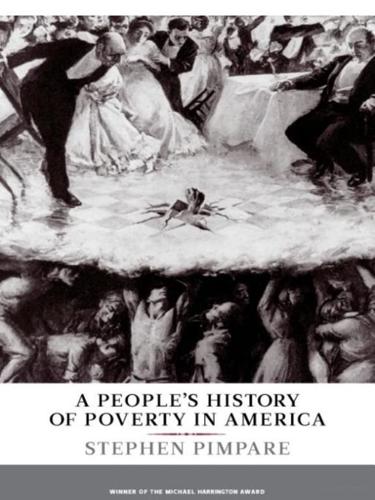
A People's History of Poverty in America
by
Stephen Pimpare
Published 11 Nov 2008
No City on a Hill A Rational Surrender Chapter 9 - Resist: Bread or Blood Passive Resistance Active Resistance Welfare Rights Embracing Indignation EPILOGUE Notes Index Copyright Page The New Press People’s History Series Howard Zinn, Series Editor A People’s History of the United States: The Wall Charts Howard Zinn and George Kirschner A People’s History of the United States: Abridged Teaching Edition Howard Zinn A People’s History of the American Revolution: How Common People Shaped the Fight for Independence Ray Raphael A People’s History of the Vietnam War Jonathan Neale The Mexican Revolution Adolfo Gilly A People’s History of the Civil War: Struggles for the Meaning of Freedom David Williams The Darker Nations: A People’s History of the Third World Vijay Prashad A People’s History of Poverty in America Stephen Pimpare A People’s History of Sports in the United States: 250 Years of Politics, Protest, People, and Play Dave Zirin for Kathleen Bergeron and JoAnn McGravey Stop a moment.
…
Taking the lives and viewpoints of common people as its point of departure, the series reexamines subjects as different as the American Revolution, the history of sports, the history of American art, the Mexican Revolution, and the rise of the Third World. A people’s history does more than add to the catalogue of what we already know. These books will shake up readers’ understanding of the past—just as common people throughout history have shaken up their always changeable worlds. Howard Zinn Boston, 2000 INTRODUCTION The Indignant Poor and the Constants of Relief I am reminded of the old lady who went from the interior to the sea. She had lived a life of poverty. She had never had enough of anything. All the food that went upon her table, all the clothing she wore, had to be carefully considered.
…
More to the point, my decisions about what to include of the accounts I have gathered are, inescapably, biased, although they are intended to be not just revealing but representative. Perhaps this is best thought of not as the culmination of a project, but as the beginning of one, especially given that I have relied here mostly upon previously published letters, diaries, journals, and interviews. The narrative is also distorted, much like its inspiration, Howard Zinn’s A People’s History of the United States, by the nature of the project itself.45 I set out consciously to offer a history of American poverty and welfare unlike the traditional ones. So, just as Zinn tells the story of Columbus’s arrival in the Bahamas through the eyes of the Arawak Indians, showing us the communities destroyed and the families slaughtered by the Great Discoverer, I’ll let the residents of Five Points, our most notorious slum, give us a glimpse into the dense, close-knit, and often joyous communities they formed there, or allow women on welfare to explain how their supposed “dependence” has made it possible for them to raise their children and behave, as they have seen it, responsibly.
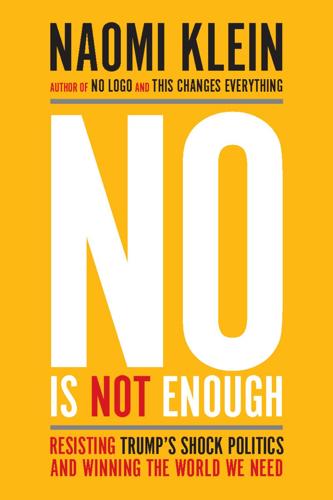
No Is Not Enough: Resisting Trump’s Shock Politics and Winning the World We Need
by
Naomi Klein
Published 12 Jun 2017
Laura Small, Environmental and Energy Study Institute, December 23, 2014, http://www.eesi.org/papers/view/fact-sheet-jobs-in-renewable-energy-and-energy-efficiency-2014. Germany: 30 percent of energy comes from renewables US Energy Information Administration, “Germany’s Renewables Electricity Generation Grows in 2015, but Coal Still Dominant,” Today in Energy, May 24, 2016, https://www.eia.gov/todayinenergy/detail.php?id=26372. Howard Zinn: “The really critical thing isn’t…” Howard Zinn, Terrorism and War (New York: Seven Stories Press, 2002), 110. Remembering When We Leapt 1911 fire at the Triangle Shirtwaist Company in New York City: death toll “The Triangle Shirtwaist Factory Fire,” Occupational Safety and Health Administration website, accessed April 18, 2017, https://www.osha.gov/oas/trianglefactoryfire-account.html.
…
So before we focus on how to win the world we want and need, we first have to get ready for the next wave of crises coming from the Trump White House, shocks that could well reverberate the world over. PART III HOW IT COULD GET WORSE: THE SHOCKS TO COME History is important. If you don’t know history it’s as if you were born yesterday. And if you were born yesterday, anybody up there in a position of power can tell you anything, and you have no way of checking up on it. —HOWARD ZINN You Can’t Be Neutral on a Moving Train, 2004 documentary CHAPTER EIGHT MASTERS OF DISASTER DOING AN END RUN AROUND DEMOCRACY There have been times in my reporting from disaster zones when I have had the unsettling feeling that I was seeing not just a crisis in the here and now, but a glimpse of our collective future—a preview of where the road we are all on is headed unless we somehow grab the wheel and swerve.
…
As a result, the kind of outside pressure that has leveraged major policy victories in the past was largely MIA during Obama’s first term. Despite some valiant attempts, there was no united progressive coalition pressuring Obama to make more of his unique moment in history, pushing him to deliver big on jobs, racial justice, clean air, clean water, and better services. That was a mistake. As the great (and much-missed) historian Howard Zinn once wrote, “The really critical thing isn’t who is sitting in the White House, but who is sitting in—in the streets, in the cafeterias, in the halls of government, in the factories. Who is protesting, who is occupying offices and demonstrating. Those are the things that determine what happens.”
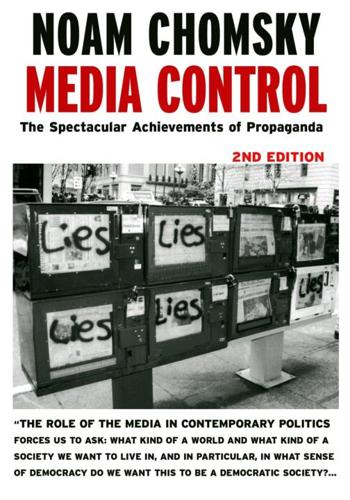
Media Control: The Spectacular Achievements of Propaganda
by
Noam Chomsky
Published 1 Jan 1974
We publish works of the imagination by such writers as Nelson Algren, Octavia E. Butler, Assia Djebar, Ariel Dorfman, Lee Stringer, and Kurt Vonnegut, to name a few, together with political titles by voices of conscience, including the Boston Women's Health Book Collective, Noam Chomsky, Ralph Nader, Gary Null, Project Censored, Barbara Seaman, Gary Webb, and Howard Zinn, among many others. Our books appear in hardcover, paperback, pamphlet, and e-book formats, in English and in Spanish. We believe publishers have a special responsibility to defend free speech and human rights wherever we can. For more information about us, visit our Web site at www.sevenstories.com or write for a free catalogue to Seven Stories Press, 140 Watts Street, New York, NY 10013.
…
Policy by Mario Murillo IsraellPalestine: How to End the War of 1948 by Tanya Reinhart Media Control: The Spectacular Achievements of Propaganda by Noam Chomsky Propaganda, Inc. by Nancy Snow Secret Trials and Executions by Barbara Olshansky Sent by Earth by Alice Walker Silencing Political Dissent by Nancy Chang Terrorism: Theirs and Ours by Equal Ahmad Terrorism and War by Howard Zinn The Umbrella of U.S. Power by Noam Chomsky Weapons in Space by Karl Grossman Visit the Seven Stories Press web site for updated information and a complete list of all available Open Media books and pamphlets. openmedia@sevenstories.com I www.sevenstories.com AVAILABLE OCTOBER 2002 FROM THE OPEN MEDIA SERIES OUR MEDIA, NOT THEIRS The Democratic Struggle Against Corporate Media by Robert W.
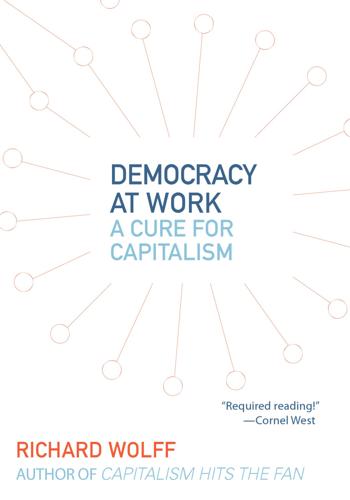
Democracy at Work: A Cure for Capitalism
by
Richard D. Wolff
Published 1 Oct 2012
Essays, by Wallace Shawn “Full of what you might call conversation starters: tricky propositions about morality . . . politics, privilege, runaway nationalist fantasies, collective guilt, and art as a force for change (or not). . . . It’s a treat to hear him speak his curious mind.” —O Magazine Howard Zinn Speaks: Collected Speeches 1963 to 2009, by Howard Zinn, edited by Anthony Arnove “Howard Zinn—there was no one like him. And to hear him speak was like listening to music that you loved—lyrical, uplifting, honest.” —Michael Moore Ours to Master and to Own: Workers' Control from the Commune to the Present, by Immanuel Ness and Dario Azzellini “Ness and Azzellini have made a major contribution in producing this insightful and exciting collection of essays on the question of workers’ control . . . it is timely and offers great strategic insight.”
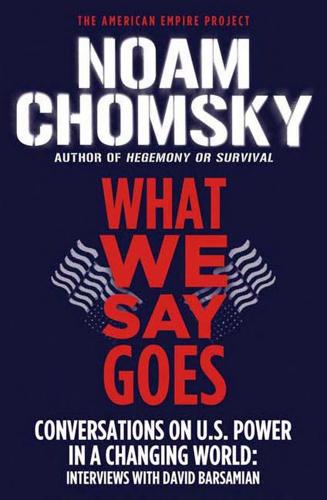
What We Say Goes: Conversations on U.S. Power in a Changing World
by
Noam Chomsky
and
David Barsamian
Published 1 Oct 2007
See also Friel and Falk, Israel-Palestine on the Record: How the New York Times Misreports Conflict in the Middle East (New York: Verso, 2007). 6 Falk and Friel, Record of the Paper, p. 15. 7 Martin Luther King Jr., “Beyond Vietnam,” in Voices of a People’s History of the United States, ed. Howard Zinn and Anthony Arnove (New York: Seven Stories Press, 2004), p. 423. 8 Howard Zinn, “The Problem Is Civil Obedience,” in ibid., pp. 483–84. 9 See, for example, editorial, “Dr. King’s Error,” New York Times, 7 April 1967, written three days after King’s “Beyond Vietnam” speech. 2. LEBANON AND THE CRISIS IN THE MIDDLE EAST 1 Greg Myre and Steven Erlanger, “Clashes Spread to Lebanon as Hezbollah Raids Israel,” New York Times, 13 July 2006. 2 Alec Russell, “Bush Lays the Blame on Hizbollah Aggression,” Daily Telegraph (London), 14 July 2006. 3 See, among other reports, Human Rights Watch, “Release All Fifteen Lebanese Hostages,” 18 April 2000, online at http://hrw.org/english/docs/2000/04/18/isrlpa486.htm. 4 Kerem Shalom, “2 Israeli Troops Killed in Attack,” Los Angeles Times, 26 June 2006. 5 United Nations, “Statement on Gaza by United Nations Humanitarian Agencies Working in the Occupied Palestinian Territory,” media release, 3 August 2006; United Nations Office for the Coordination of Humanitarian Affairs, Humanitarian Monitor: Occupied Palestinian Territory, no. 2 (June 2006). 6 On June 24, 2006, Osama and Mustafa Abu Muamar were abducted by the Israel Defense Forces in Al Shouka, near Rafah.
…
It’s obviously true in the United States. But was the United States “at war” in 1967? King suggests it was. It’s an odd sense of being at war. The United States was attacking another country—in fact, it was attacking all of Indochina—but had not been attacked by anybody. So what’s the war? It was just plain, outright aggression. Howard Zinn, in his speech “The Problem Is Civil Obedience,” says civil disobedience is “not our problem … . Our problem is civil obedience,” people taking orders and not questioning. How do we confront that?8 Howard is quite right. Obedience and subordination to power are the major problem, not just here but everywhere.
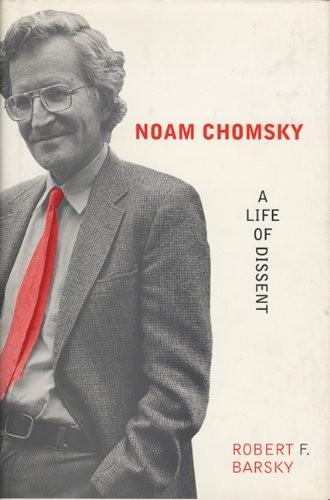
Noam Chomsky: A Life of Dissent
by
Robert F. Barsky
Published 2 Feb 1997
This book is therefore filled with names of organizations, publications, and individual thinkers that have not been adequately discussed in relation to Chomsky's political work: the organizations include the left wing of Avukah, Black Power, the Council Communists, Freie Arbeiter Stimme, Hashomer Hatzair, the Independent Labor Party, the International Confederation for Disarmament and Peace (ICDP), the League for ArabJewish Cooperation, the League for Arab-Jewish Rapprochement, the Marlenites, Resist, workers' control; among the journals I mention are International Council Correspondence, Living Marxism, Avukah Student Action, and Politics; and some of the individuals I look at are Chomsky contemporaries Yehoshua Bar-Hillel, Ken Coates, David Dellinger, Peggy Duff, Mitchell Goodman, Zellig Harris, Edward file:///D|/export1/www.netlibrary.com/nlreader/nlreader.dll@bookid=9296&filename=page_6.html [4/16/2007 2:28:52 PM] Document Page 7 S. Herman, Jim Kelman, Denise Levertov, Robert Lowell, Norman Mailer, Paul Mattick, Raymond Williams, and Howard Zinn, to name but a few. While the work of another set of Chomsky contemporariesSam Abramovitch, Norman Epstein (whom Chomsky met fifteen years ago for the first time), Karl Korsch, Christopher Lasch, Dwight Macdonald (with whom Chomsky had contact in the 1960s), Seymour Melman (with whom Chomsky had casual contact early on, and who became a close friend), Karl Polanyi, and Arthur Rosenberghad no direct impact upon Chomsky's endeavors, it does provide some important insight into his thinking, and is therefore explored here.
…
I've always read it, and sometimes find interesting thingsmuch more so in the 1950s, before Howe's bitter resentment of the student movement and the New Left for failing to pay enough attention to him, and the post-1967 switch to unthinking Zionist commitments (largely as a weapon against the New Left, it seems), which changed the character of the journal quite sharply, as you can tell by reading it (try to find something about Israel or Zionism pre-1967, for example). (14 Aug. 1995) The Example of Peggy Duff The activist community Chomsky entered during this period was vast and loosely knit. Many have attempted to draw a portrait of this milieuDavid Dellinger and Howard Zinn have each written about it. Here, however, with the aim of exemplifying what Chomsky considers to be useful activist work, I've chosen to focus on one important individual: Peggy Duff. Chomsky's own lists of key activists generally contain names that are rarely mentioned beyond certain small circles.
…
Unlike (say) Irving Howe, Duff was not relied upon by the popular media for commentary on current events; she is not mentioned in mainstream history books; and her work has been played down or ignored. The mainstream historical record of the late 1960s, like that of virtually any period, contains very few references to really important activist work. The prevalence of this kind of willful ignorance is another leitmotif for Chomsky. If it weren't for Howard Zinn and a few others, few (apart from actual participants) would even know about the SNCC, the leading element in the civil rights movement. Similarly, the truth about the Black Panthers is not, and never will be, made known, I suppose. Resist was supporting elements of the Panthers from very early on, discriminating quite carefully between the serious organizers (like Fred Hampton) and the criminal elements and hustlers. (31 Mar. 1995) Of course, resistance has a priceas Mailer, Spock, and Coffin, among so many others, learned during this eraand people such as Black Panther Fred Hampton ended up by paying with their lives.
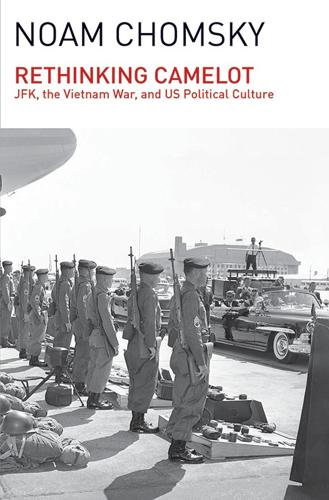
Rethinking Camelot
by
Noam Chomsky
Published 7 Apr 2015
In contrast, withdrawal without victory would have been highly controversial. Within the domestic mainstream, that position received scant support: the first timid editorial advocacy of it, to my knowledge, was in late 1969, well after corporate and political elites had determined that the operation should be liquidated as too costly. When Howard Zinn published a book in 1967 calling for US withdrawal, the idea was considered too outlandish even to discuss.43 The question to be considered, then, is whether JFK, despite his 1961-1962 escalation and his militant public stand, planned to withdraw without victory, a plan aborted by the assassination, which cleared the way for Lyndon Johnson and his fellow-warmongers to bring on a major war. 6.
…
Hilsman, To Move a Nation, 580, 537, 411. 5. Ibid., 531n., 536f., 510f. 6. Ibid., 527ff. FRUSV-64, 179-82. 7. Schlesinger, Bitter Heritage; see APNM, ch. 4. On the PR function of staged elections in Vietnam and elsewhere, see Herman and Brodhead, Demonstration Elections; MC, ch. 3. 8. Schlesinger, RFK, 734, 739. 9. See FRS, 25. 10. Howard Zinn and I were the applicants; the chapter was Arlington, near Cambridge. The details are not without interest. 11. On media coverage of the war from the early 1950s through 1985, see MC, 169-296 and App. 3. 12. Lewis and others, see MC, 170f. Kann, WSJ, Sept. 9, 1992. Michael Elliott, BG, Oct. 27, 1991.
…
Deterring Democracy (Verso, 1991; updated edition, Hill &Wang, 1992) [DO] ———. Year 501 (South End Press, 1993) [501] ———. Letters from Lexington: Reflections on Propaganda (Common Courage, 1993) [LL] ———, and Edward Herman. Political Economy of Human Rights (South End Press, 1979) [PEHR] ———, and Howard Zinn, eds. Pentagon Papers, vol. 5, Analytic Essays and Index (Beacon Press, 1972) [PP V] Cooper, Chester. The Lost Crusade (Dodd, Mead, 1970) Cumings, Bruce. The Origins of the Korean War, vol. II (Princeton, 1990) Drinnon, Richard. Facing West: The Metaphysics of Indian-Hating and Empire-Building (Minnesota, 1980) Du Boff, Richard.
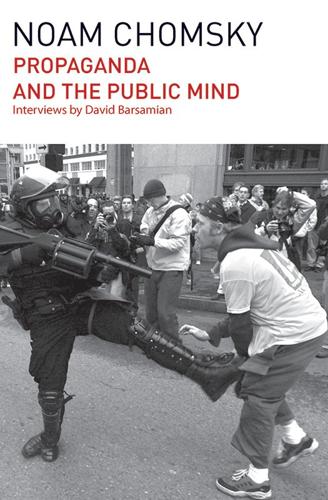
Propaganda and the Public Mind
by
Noam Chomsky
and
David Barsamian
Published 31 Mar 2015
It has some of the qualities of Revelations, the Old Testament prophets and Blake.” —Times Literary Supplement “Noam Chomsky is like a medic attempting to cure a national epidemic of selective amnesia.” —Village Voice Praise for David Barsamian “David Barsamian is the Studs Terkel of our generation.” —Howard Zinn, author, A People’s History of the United States “In conversation [with David Barsamian], Chomsky is more relaxed, tentative, and discursive than he is in his books or his public speaking engagements.” —Vancouver Sun Copyright ©2001 by Noam Chomsky and David Barsamian. First published in 2001 by South End Press, Cambridge, Massachusetts This edition published in 2015 by Haymarket Books P.O.
…
And there may well be. One could think about that. Iraqi opposition groups have made proposals. They should be considered. Whether they should be implemented or not is a decision. But the assumption right off that we have to “go in” and “do something” should be questioned. Who gave us that right? You, Edward Said, Howard Zinn, and Ed Herman recently issued a statement on Iraq.21 You say, “The time has come for a call to action to people of conscience.... [W]e must organize and make this issue a priority, just as Americans organized to stop the war in Vietnam....We need a national campaign to lift the sanctions.” I know you’re not against sanctions in all instances, for example, you cite South Africa as quite a separate case.
…
Herman, and Herbert I. Schiller, Hope and Folly: The Unitd States and Unesco, 1945-1985 (Minneapolis: University of Minnesota Press, 1989). 20. Serge Schmemann, “The Critics Now Ask: After Missiles, What?” New York Times, December 18, 1998, p. A23. 21. Noam Chomsky, Edward S. Herman, Edward Said, and Howard Zinn, “A Call to Action on Sanctions and the U.S. War Against the People of Iraq.” On-line at http:/ /www.zmag.org/CrisesCurEvts/Iraq /callaction.htm. See also, Noam Chomsky et al., “Sanctions Are a Weapon of Mass Destruction,” in Arnove ed., Iraq Under Siege, pp. 1 81-3. Initial Statement drafted by Robert Jensen. 22.
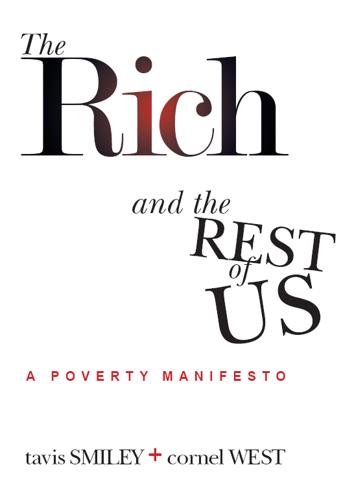
The Rich and the Rest of Us
by
Tavis Smiley
Published 15 Feb 2012
Europe was forced to concede its territory after a bloody eight-year war that seeded democracy and formed a core set of values that would continue to challenge and shape economic, political, and social life in America for centuries to come. What’s missing in most American history books is the extent to which this country amassed its riches from free, Black slave labor. In his book, A People’s History of the United States, 1492–Present (New York: Harper, 2003), professor, activist, and author Howard Zinn defines the cruelty of human bondage aggravated by “the frenzy for limitless profit that comes from capitalistic agriculture.”60 Academy Award–winning filmmaker, best-selling author, and social critic Michael Moore elaborated on this theme during the “Remaking America” symposium: “This is a nation founded on genocide and built on the backs of slaves,” Moore said.
…
Divided Into ‘Haves,’ ‘Have-Nots,’” Gallup.com, December 15, 2011, retrieved from http://www.gallup.com/poll/151556/Fewer-Americans-Divided-Haves-Nots.aspx/. 57 “45% Say Government Programs Increase Poverty in America,” Rasmussen Report, April 6, 2011, retrieved from http://www.rasmussenreports.com/public_content/business/general_businesss/april_2011/45_say_government_programs_increase_poverty_in_america/. 58 “Bill O’Reilly, Tavis Smiley, and Cornel West Have Fiery Clash Over Wall Street, Poverty” (video), Roland Martin Reports, October 12, 2011, retrieved from http://rolandmartinreports.com/blog/2011/10/bill-oreilly-tavis-smiley-and-cornel-west-have-fiery-clash-over-wall-street-poverty-video/. 59 Bruce Watson, “It’s Official: Weath Gap Has Turned America Into a Seething Pit of Class Resentment,” Daily Finance.com/January 13, 2012, retrieved from http://www.dailyfinance.com/2012/01/13/its-official-wealth-gap-has-turned-america-into-a-seething-pit/. 60 Howard Zinn, A People’s History of the United States: 1492–Present (New York: Harper Perennial, 2003). 61 The Industrial Revolution, History.com, retrieved from http://www.history.com/topics/industrial-revolution and http://www.history.com/topics/child-labor/ 62 Andrew Gavin Marshall, Robber Barons, Revolution, and Social Control: The Century of Social Engineering, Part I, Global Research.ca, March 10, 2011, retrieved from http://globalresearch.ca/index.php?
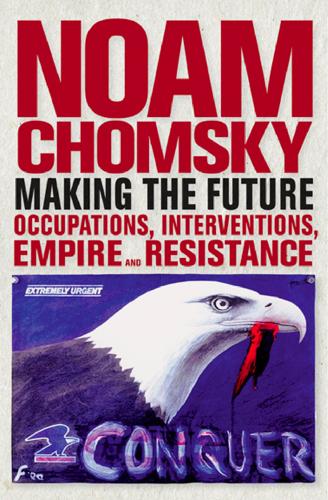
Making the Future: The Unipolar Imperial Moment
by
Noam Chomsky
Published 15 Mar 2010
The irony is that the seeds for future superpower conflict are being sown on an ecological preserve and island of peace. Occupy the Future October 31, 2011 This article is adapted from Noam Chomsky’s talk at the Occupy Boston encampment on Dewey Square on October 22, 2011. He spoke as part of the Howard Zinn Memorial Lecture Series held by Occupy Boston’s on-site Free University. Delivering a Howard Zinn lecture is a bittersweet experience for me. I can’t help but regret that he’s not here to take part in and invigorate a movement that would have been the dream of his life, and for which he laid a lot of the groundwork. The Occupy movements are exciting, inspiring.
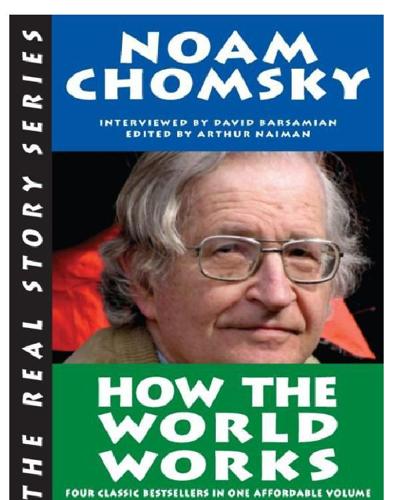
How the World Works
by
Noam Chomsky
,
Arthur Naiman
and
David Barsamian
Published 13 Sep 2011
Business Week reported that working days lost to injury almost doubled from 1983 to 1986, in part because “under Reagan and [Vice-President] Bush, [OSHA] was a hands-off agency.” The same is true of the environmental issues—toxic waste disposal, say. Sure, they’re killing people, but is it criminal? Well, it should be. Howard Zinn and I visited a brand-new maximum-security federal prison in Florence, Colorado. The lobby has high ceilings, tile floors, glass everywhere. Around the same time, I read that New York City schools are so overcrowded that students are meeting in cafeterias, gyms and locker rooms. I found that quite a juxtaposition.
…
You’ve always seen top-down strategies and movements as inherently doomed. They can succeed very well at exactly what they’re designed to do—maintain top-down leadership, control and authority. It shouldn’t have come as a tremendous surprise to anyone that a vanguard party would end up running a totalitarian state. Howard Zinn suggests that we need to recognize that real social change takes time. We need to be long-distance runners, not sprinters. What do you think of that? He’s right. It was very striking in parts of the student movement in the 1960s. There wasn’t an organized, well-established, popular-based left for the students to join, so their leaders were sometimes very young people.
…
Manufacturing dissent Michael Moore made a documentary film called Roger and Me and produced a television series called TV Nation. In his book Downsize This!, he says that what turns people off about the left is that it’s boring, it whines too much, it’s too negative. Anything to that? I don’t think Howard Zinn, say, whines too much and turns people off, but there are probably other people who do. To the extent that that’s true, it’s a problem they should overcome. Take the example of the media group in Brazil we discussed earlier, which presented television skits that turned people off because they were boring and full of jargon.
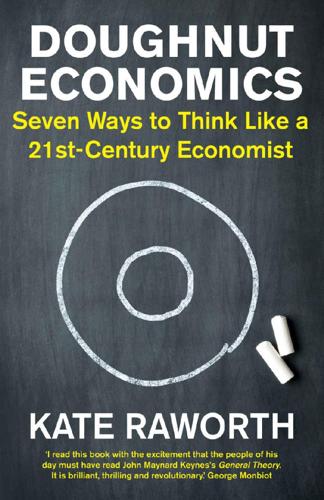
Doughnut Economics: Seven Ways to Think Like a 21st-Century Economist
by
Kate Raworth
Published 22 Mar 2017
Putnam, R. (2000) Bowling Alone: The Collapse and Revival of American Community. New York: Simon & Schuster, p. 19. 26. Putnam, R. (2000) Bowling Alone, p. 290. 27. ‘Election day will not be enough’: an interview with Howard Zinn, by Lee, J. and Tarleton, J. The Indypendent, 14 November 2008, available at: http://howardzinn.org/election-day-will-not-be-enough-an-interview-with-howard-zinn/ 28. Marçal, K. (2015) Who Cooked Adam Smith’s Dinner? London: Portobello. 29. Folbre, N. (1994) Who Pays for the Kids? London: Routledge. 30. Coote, A. and Goodwin,. N. (2010) The Great Transition: Social Justice and the Core Economy. nef working paper 1.
…
A thriving society, in addition, is more likely to build strong political engagement, starting with community meetings, grassroots organising, voting in elections, and joining social and political movements that hold political representatives to account. ‘Significant changes occur when social movements reach a critical point of power capable of moving cautious politicians beyond their tendency to keep things as they are,’ writes the American historian Howard Zinn, pointing to his own country’s nineteenth-century anti-slavery movement and twentieth-century civil rights movement.27 Democratic governance of society and the economy rests on the right and capacity of citizens to engage in public debate – hence the importance of ‘political voice’ within the Doughnut’s social foundation.

Undoing Border Imperialism
by
Harsha Walia
Published 12 Nov 2013
Movements that orient themselves toward decolonization—through structural analysis and action as well as by rectifying our relations with one another and in particular with Indigenous communities and lands—are transformative, healing, and revolutionary. Ultimately, such decolonizing movements are sustainable and sustain us precisely because they provide meaning and purpose to those in the struggle. Celebrated historian Howard Zinn reminds us, “The reward for participating in a movement for social justice is not the prospect of future victory. It is the exhilaration of standing together with other people, taking risks together, enjoying small triumphs and enduring disheartening setbacks together.”(36) For me, NOII has been one such decolonizing movement.
…
Paula Gunn Allen, The Sacred Hoop: Recovering the Feminine in American Indian Traditions (Boston: Beacon Press, 1992), 190. 34. Mia McKenzie, “The Summer We Got Free,” Mia McKenzie, http://miamckenzie.net/the-summer-we-got-free/ (accessed March 6, 2013). 35. Quoted in Colin Ward, Anarchy in Action (London: Freedom Press, 1973), 23. 36. Howard Zinn, You Can’t Be Neutral on a Moving Train: A Personal History of Our Times (Boston: Beacon Press, 1994), 83. Credits for Anarchist Interventions Harsha Walia Harsha is a South Asian activist, writer, and popular educator who has been active in migrant justice, antiracist, feminist, Indigenous solidarity, Palestinian liberation, anti-imperialist, and anticapitalist movements and communities for over a decade.
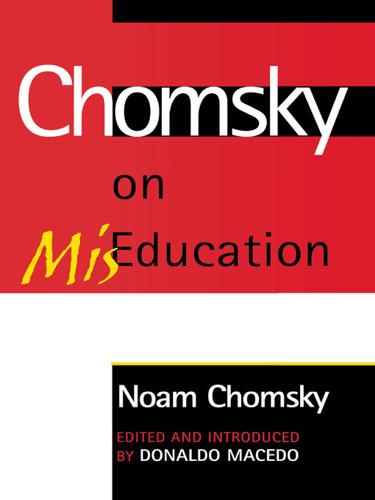
Chomsky on Mis-Education
by
Noam Chomsky
Published 24 Mar 2000
Teachers who are paid to safeguard the ideological doctrinal system have little interest or incentive to teach students that the United States has systematically violated the Pledge of Allegiance, from the legalization of slavery, the denial of women’s rights, and the near-genocide of Native Americans to the contemporary discriminatory practices against people who, by virtue of their race, ethnicity, or gender, are not treated with the dignity and respect called for in the Pledge. These teachers also have little incentive to teach Howard Zinn’s People’s History of the United States, from which students could learn that, once upon a time, the Massachusetts legislature promulgated a law that provided monetary rewards for dead Indians: “For every scalp of a male Indian brought in . . . forty pounds. For every scalp of such female Indian or male Indian under the age of twelve years that shall be killed . . . twenty pounds.”21 They also have little interest in teaching students that even antislavery President Abraham Lincoln did not truly uphold the U.S.
…
Loewen, Lies My Teacher Told Me. 19. Pink Floyd, “Another Brick in the Wall,” copyright 1979 Pink Floyd Music Limited. 20. Barbara Flores, “Language Interference on Influence: Toward a Theory for Hispanic Bilingualism” (Ph.D. dissertation, University of Arizona at Tuscon, 1982), 131. 21. Cited in Howard Zinn, Declarations of Independence: Now Examining American Ideology (New York: HarperCollins, 1990), 234-35. 22. Zinn, Declarations of Independence. 23. Cited in Noam Chomsky, Towards a New Cold War (New York: Pantheon, 1982), 339-40. 24. Chomsky, Towards a New Cold War. 25. Cited in Paulo Freire and Donaldo Macedo, Literacy: Reading the Word and the World (South Hadley, Mass.: Bergin & Garvey, 1987), 130. 26.
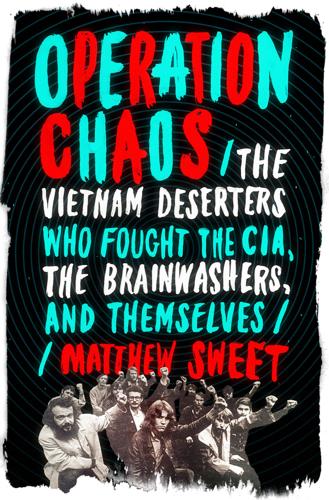
Operation Chaos: The Vietnam Deserters Who Fought the CIA, the Brainwashers, and Themselves
by
Matthew Sweet
Published 13 Feb 2018
Published reviews went into HYDRA’s maw: Report to the President by the Commission on CIA Activities Within the United States, June 1975, https://www.fordlibrarymuseum.gov/LIBRARY/exhibits/Intelligence/RockComm_Chap11_CHAOS.pdf. “the extremist anti-war movement”: Briefing Papers, Special Operations Group, Counter Intelligence Staff, June 1, 1972, MuckRock, https://cdn.muckrock.com/foia_files/2016/05/16/CHAOS.pdf. an FBI tap installed on the phone of Howard Zinn: Howard Zinn, FBI file 100-360217, https://vault.fbi.gov/Howard%20Zinn%20. a colorful intermediary named Brian Victoria: Associated Press, “Anti-U.S. Rioting in Japan,” St. Louis Post-Dispatch, October 22, 1968. “misguided youngsters gone astray in a foreign land”: CIA file 104-10064-10013, memo from Thomas Karamessines, CIA deputy director of plans, October 1, 1968, http://www.maryferrell.org/showDoc.html?
…
These were American agents living undercover among American subversives abroad. How many of them, I wondered, had I already taken out to lunch? * * * THE CIA WAS on the deserters’ case right from the beginning, before the Intrepid Four had even left Japan. It was receiving information from an FBI tap installed on the phone of Howard Zinn, a Boston University historian and vigorous anti-war campaigner. When a member of Beheiren called Zinn to discuss the fate of the four sailors, someone pressed play and record. Through this surveillance, the CIA learned that Ernest P. Young, a history professor at Dartmouth College, had agreed to travel to Tokyo in order to check out the deserters on behalf of the U.S. peace movement.
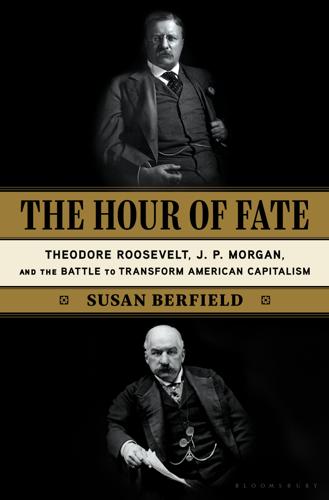
The Hour of Fate
by
Susan Berfield
Conductor Arthur Lindsley: “Conductor Arthur Lindsley,” Mower County Transcript, April 3, 1873, 1. 29. Fireman R. Brown: “Fireman and Brakeman Killed,” Star Tribune, July 18, 1873, 4 30. Amandas Hagerty: “A Man Killed,” Carbon Advocate, November 29, 1873. 31. “within the parallels”: Ellis Paxon Oberholtzer, Jay Cooke, 313. 32. Two hundred or so: Howard Zinn, A People’s History of the United States, 243; “Wreck of the Metropolis,” New York Tribune, February 1, 1878, 1; “Other Accounts of the Wreck,” New York Times, February 1, 1878, 1; “The Feeling at Philadelphia,” New York Times, February 2, 1878, 1. 33. “Bread is”: James Dabney McCabe, The History of the Great Riots, 1877, 202. 34.
…
“Heed the voice”: Details about Coxey’s March from Jack Kelly, The Edge of Anarchy, 29–31; Lucy Barber, Marching on Washington: The Forging of an American Tradition (Berkeley, CA: University of California Press, 2004), 33, 36. 40. More than eight thousand: Details about the company town from Richard Ely, “Pullman: A Social Study,” Harper’s Weekly (February 1885): 452–66. 41. More than two hundred thousand: Details from Kelly, Edge of Anarchy, 109, 123. 42. Simmering violence: Howard Zinn, A People’s History of the United States, 281. 43. “Put forth its efforts”: Eugene V. Debs, “Proclamation to American Railway Union,” June 1, 1895 in Debs: His Life, Writing and Speeches, 292. 44. Among the lines: Details of Morgan’s reorganization efforts from Ron Chernow, The House of Morgan, 66–69. 45.
…
Sixteen of them: Details of the flood’s aftermath from David McCullough, The Johnstown Flood (New York: Simon & Schuster, 1968), 258, 264. 33. Early in the summer: Account of the Homestead strike, and Knox’s role in particular, from Paul Krause, The Battle for Homestead, 1880–1892, 3, 26–37, 310; Howard Zinn, A People’s History of the United States, 277, David Nasaw, Andrew Carnegie, 428–48. 34. Gatling guns: Official Documents, Comprising the Department and Other Reports Made to the Governor, Senate and House of Representatives of Pennsylvania, 1892, 116–17. 35. On July 23: Details from Paul Avrich and Karen Avrich, Sasha and Emma: The Anarchist Odyssey of Alexander Berkman and Emma Goldman (Cambridge, MA: Belknap Press, 2012), 65–67. 36.
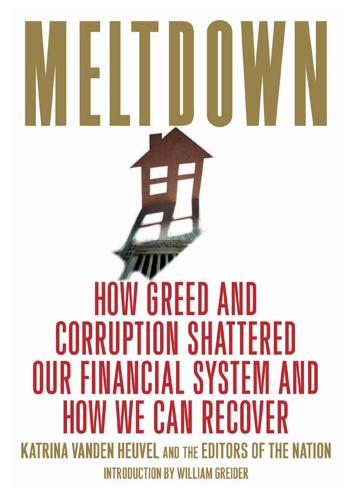
Meltdown: How Greed and Corruption Shattered Our Financial System and How We Can Recover
by
Katrina Vanden Heuvel
and
William Greider
Published 9 Jan 2009
Stiglitiz 191 View from Asia by Walden Bello 196 Born-Again Democracy by William Greider 199 The Suicide Solution by Barbara Ehrenreich 207 The Great Depression II by Nicholas von Hoffman 210 We’re All Minskyites Now by Robert Pollin 213 The Bailout: Bush’s Final Pillage by Naomi Klein 217 Part Four: The Road to Recovery How to Fix Our Broken Economy by Jeffrey Madrick 225 Ending Plutocracy: A 12-Step Program by Sarah Anderson and Sam Pizzigati 234 Trust but Verify by James K. Galbraith and William K. Black 244 King George and Comrade Paulson by Ralph Nader 247 A Big Government Bailout by Howard Zinn 249 Water the Roots by Rev. Jesse L. Jackson 253 America Needs a New New Deal by Katrina vanden Heuvel and Eric Schlosser 255 What Do We Want? An Emergency Town Hall Featuring William Greider, Francis Fox Piven, Doug Henwood, Arun Gupta and Naomi Klein. Moderated by Christopher Hayes 260 The Global Perspective by Will Hutton 270 How to End the Recession by Robert Pollin 287 In Praise of a Rocky Transition by Naomi Klein 297 Acknowledgments 301 List of Contributors 303 Preface The year 2008 will live in infamy in the annals of American economic history.
…
Her articles have appeared in the Washington Post, the Los Angeles Times, the New York Times and the Boston Globe. Kai Wright, a writer in Brooklyn, New York, is the author of Drifting Toward Love: Black, Brown, Gay and Coming of Age on the Streets of New York. He is a columnist for TheRoot.com. Howard Zinn is the author of A People’s History of the United States, A Power Governments Cannot Suppress and most recently, A People’s History of American Empire. Meltdown.qxd 11/21/08 1:20 PM Page 311 Document Outline Contents Preface Introduction Part One: Seeds of Disaster Wall Street and Washington: How the Rules of the Game Have Changed The Looting Decade (Excerpt) Democratize the Fed?
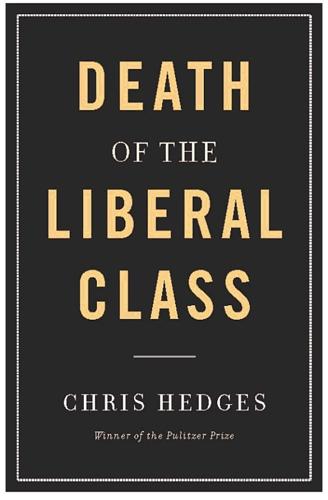
Death of the Liberal Class
by
Chris Hedges
Published 14 May 2010
By contrast, as long as illegalities and violations of democratic substance are confined to marginal groups or dissident victims of U.S. military attack, or result in a diffused cost imposed on the general population, media opposition is muted and absent altogether. This is why Nixon could go so far, lulled into a false sense of security precisely because the watchdog only barked when he began to threaten the privileged.25 Howard Zinn in the People’s History of the United States examined history through the eyes of Native Americans, immigrants, slaves, women, union leaders, persecuted socialists, anarchists and communists, abolitionists, antiwar activists, civil rights leaders, and the poor. Zinn’s work has been castigated by many academic historians, largely because he broke with the mold of writing about the great and the powerful.
…
Matthew Grell, on February 22, 1952, told agents that she considered Zinn and another neighbor, Mrs. Julius Scheiman, “to be either communists or communist sympathizers” because, the agents wrote, Grell “had observed copies of the Daily Workers in Mrs. Scheiman’s apartment and noted that Mrs. Scheiman was a good friend of Howard Zinn.” The FBI, which describes Zinn as a former member of the Communist Party, something Zinn repeatedly denied, appears to have picked up its surveillance when Zinn, who was teaching at Spelman, a historically black women’s college, became involved in the civil rights movement. Zinn served on the Student Nonviolent Coordinating Committee.
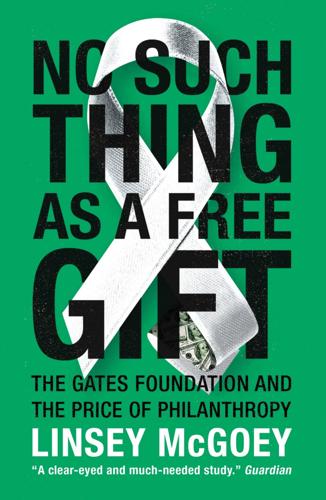
No Such Thing as a Free Gift: The Gates Foundation and the Price of Philanthropy
by
Linsey McGoey
Published 14 Apr 2015
The worthy were those who would avail themselves of ‘free libraries, parks, and means of recreation, by which men are helped in body and mind’.26 Carnegie’s business empire expanded by cultivating useful political allies and alliances with fellow industrialists, including Frick, who Carnegie took on as a business partner in 1882. Over the next decade, they honed labour policies that were fiercely resisted by their workers. American labourers were sceptical of the idea that the growing wealth of business magnates would inevitably enrich their own lives. In 1892, as Howard Zinn describes, a wave of strikes ignited across the US: a general strike in New Orleans; a coal miners’ strike in Tennessee; a copper miners’ strike in Coeur d’Alene, Idaho. The strikes were often bloody affairs: the conflict in Coeur d’Alene resulted in five dead and sixteen in hospital.27 The Homestead strike began early in the summer months of 1892 and lasted until the air grew chill.
…
That following year, 2014, contributions to WHO by the U.S. government slightly outpaced the Gates Foundation. 12Michael Edwards, Small Change: Why Business Won’t Change the World (New York and London: Demos, 2010); see also Lisa Ann Richey and Stefano Ponte, Brand Aid: Shopping Well to Save the World (Minneapolis, MN: University of Minnesota Press, 2011); Gavin Fridell and Martijn Konings, eds., Age of Icons: Exploring Philanthrocapitalism in the Contemporary World (Toronto: University of Toronto Press, 2013); Robin Rogers, ‘Why Philanthro-policymaking Matters,’ Society, vol. 48, 376–81; and Iain Hay and Samantha Muller, ‘Questioning Generosity In The Golden Age of Philanthropy: Towards Critical Geographies of Super-philanthropy’, Progress in Human Geography, vol. 38, no. 5 (2014), 635–53. 13Email interview with author. 14The description of Frick’s three-mile fence comes from Howard Zinn, A People’s History of the United States (New York: Harper Perennial, 1980); see also David Nasaw, Andrew Carnegie (Harmondsworth: Penguin, 2007), and Kevin Phillips, Wealth and Democracy: A Political History of the American Rich (New York: Broadway Books, 2002). 15Nasaw, Andrew Carnegie, 456–7. 16Quoted by David Nasaw, ‘Introduction’, in Andrew Carnegie, The ‘Gospel of Wealth’ Essays and Other Writings (Harmondsworth: Penguin, 1996), xiii. 17Ralph Waldo Emerson, Self-Reliance and Other Essays (New York: Digireads Books, 2013 [1841]), 31. 18Oscar Wilde, The Soul of Man Under Socialism and Other Essays (Harmondsworth: Penguin, 2001 [1891]), 130.
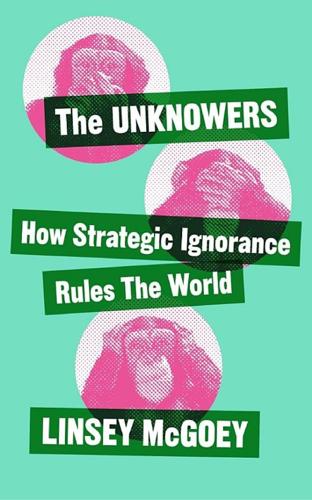
The Unknowers: How Strategic Ignorance Rules the World
by
Linsey McGoey
Published 14 Sep 2019
Really, all that changed in the 1930s and 1940s was that the type of private citizen entitled to government welfare now included more members of the worker classes rather than simply the wealthy. And even the New Deal policies largely favoured only white Americans and not black citizens. Black Americans, as historian Howard Zinn points out, ‘were ignored by New Deal programs … as tenant farmers, as farm labourers, as migrants, as domestic workers, they didn’t qualify for unemployment insurance, minimum wages, social security or farm subsidies.’ Zinn adds that Franklin Roosevelt, to appease white politicians in the south, chose not to back a federal anti-lynching bill.6 It is not that commercial activity wasn’t widespread in early America or that industrialists were not pioneering new methods; indeed, industries were mushrooming so quickly that Alexis de Tocqueville, visiting the country in the 1830s, grew concerned by the aristocratic propensity of the new industrialists.
…
New Political Economy, doi: 10.1080/13563467.2018.1458086. 5 C. Dunlavy, 1991. ‘Mirror images: Political structure and early railroad policy in the United States and Prussia.’ Studies in American Political Development 5: 1–35; C. Dunlavy and T. Welskopp, 2007. ‘Myths and peculiarities: Comparing US and German capitalism.’ GHI Bulletin 41, Autumn. 6 Howard Zinn, A People’s History of the United States (New York: Harper & Row, 1980), 394. 7 A. de Tocqueville, Democracy in America (New York: Perennial Classics, 1966 [1835]), 556–557. 8 Dunlavy and Welskopp, Myths and Peculiarities. 9 Tocqueville, Democracy in America, 685. 10 Ibid., 696. 11 Ibid., 684. 12 Ibid, 686. 13 Ibid, 686. 14 Ibid., 693. 15 Ibid., 698. 16 Ibid., 701. 17 For example, David Runciman, in an otherwise superb study of Tocqueville, ignores Tocqueville’s remarks about the corrosive effects of private industry on democratic governance.
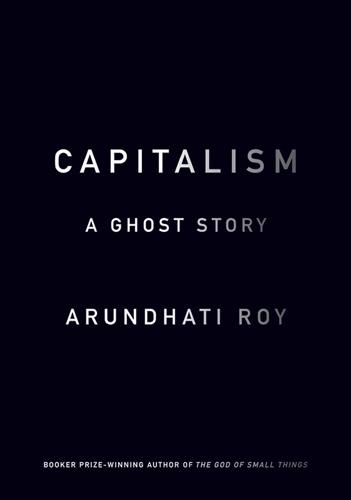
Capitalism: A Ghost Story
by
Arundhati Roy
Published 5 May 2014
Chapter 3 DEAD MEN TALKING On September 23, 2011, at about three o’clock in the morning, within hours of his arrival at the Delhi airport, the US radio-journalist David Barsamian was deported.1 This dangerous man, who produces independent, free-to-air programs for public radio, has been visiting India for forty years, doing dangerous things like learning Urdu and playing the sitar. He has published book-length interviews with Edward Said, Noam Chomsky, Howard Zinn, Ejaz Ahmed, and Tariq Ali. (He even makes an appearance as a young, bell-bottom-wearing interviewer in Peter Wintonik’s documentary film based on Chomsky and Edward S. Herman’s Manufacturing Consent.) On his more recent trips to India he has done a series of radio interviews with activists, academics, filmmakers, journalists, and writers (including me).
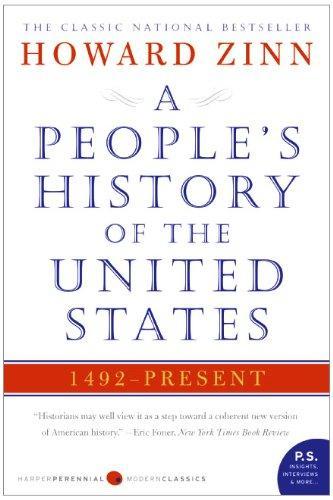
A People's History of the United States
by
Howard Zinn
Published 2 Jan 1977
To Warner Bros., for the excerpt from “Brother Can You Spare a Dime?” Lyric by Jay Gomey, Music by E. Y. Harburg. © 1932 Warner Bros. Inc. Copyright Renewed. All Rights Reserved. Used By Permission. About the Author HOWARD ZINN is a historian, playwright, and social activist. He lives with his wife, painter Roslyn Zinn, in Auburndale, Massachusetts. Visit www.AuthorTracker.com for exclusive information on your favorite HarperCollins author. Other Books by Howard Zinn La Guardia in Congress 1959 The Southern Mystique 1964 SNCC: The New Abolitionists 1964 New Deal Thought (editor) 1965 Vietnam: The Logic of Withdrawal 1967 Disobedience and Democracy 1968 The Politics of History 1970 The Pentagon Papers: Critical Essays 1972 (editor, with Noam Chomsky) Postwar America 1973 Justice in Everyday Life (editor) 1974 Declarations of Independence: Cross-Examining American Ideology 1991 Failure to Quit: Reflections of an Optimistic Historian 1993 You Can’t Be Neutral on a Moving Train 1994 The Zinn Reader 1997 The Future of History 1999 Marx in Soho: A Play on History 1999 On War 2001 On History 2001 Terrorism and War 2002 Emma: A Play 2002 Copyright A PEOPLE’S HISTORY OF THE UNITED STATES.
…
A PEOPLE’S HISTORY OF THE UNITED STATES 1492—PRESENT HOWARD ZINN To Noah, Georgia, Serena, Naushon, Will—and their generation Contents Cover Title Page Chapter 1 – Columbus, the Indians, and Human Progress Chapter 2 – Drawing the Color Line Chapter 3 – Persons of Mean and Vile Condition Chapter 4 – Tyranny Is Tyranny Chapter 5 – A Kind of Revolution Chapter 6 – The Intimately Oppressed Chapter 7 – As Long as Grass Grows or Water Runs Chapter 8 – We Take Nothing by Conquest, Thank God Chapter 9 – Slavery Without Submission, Emancipation Without Freedom Chapter 10 – The Other Civil War Chapter 11 – Robber Barons and Rebels Chapter 12 – The Empire and The People Chapter 13 – The Socialist Challenge Chapter 14 – War is the Health of the State Chapter 15 – Self-Help in Hard Times Chapter 16 – A People’s War?
…
Chapter 21 – Carter-Reagan-Bush: The Bipartisan Consensus Chapter 22 – The Unreported Resistance Chapter 23 – The Coming Revolt of the Guards Chapter 24 – The Clinton Presidency Chapter 25 – The 2000 Election and the “War on Terrorism” Afterword Bibliography Index Acknowledgments About the Author Other Books by Howard Zinn Copyright About the Publisher Chapter 1 Columbus, the Indians, and Human Progress Arawak men and women, naked, tawny, and full of wonder, emerged from their villages onto the island’s beaches and swam out to get a closer look at the strange big boat. When Columbus and his sailors came ashore, carrying swords, speaking oddly, the Arawaks ran to greet them, brought them food, water, gifts.
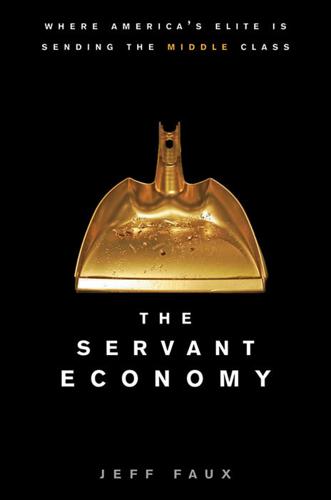
Servant Economy: Where America's Elite Is Sending the Middle Class
by
Jeff Faux
Published 16 May 2012
In 1845, the country’s population was roughly twenty million people. Throughout the next ten years, approximately three million immigrants arrived. Most were stuffed into vastly overcrowded city slums, where they and their children suffered brutal working conditions and a life of squalor and disease. Howard Zinn, who told the story of the United States from the perspective of the poor and the working class, wrote, “In Philadelphia, working-class families lived fifty-five to a tenement, usually one room per family, with no garbage removal, no toilets, no fresh air or water. . . . In New York . . . filthy water drained into yards and alleys, into the cellars where the poorest of the poor lived, bringing with it a typhoid epidemic in 1837, typhus in 1842.
…
Benjamin Franklin, “Observations concerning the Peopling of Countries, Philadelphia, 1751,” cited in Joseph Schaefer, “Was the West a Safety Valve for Labor?” Mississippi Historical Review 24, no. 3 (December 1937): 299–314. 3. Quoted in Schaefer, “Was the West a Safety Valve for Labor?,” 311. 4. Howard Zinn, A People’s History of the United States, rev. ed. (New York: HarperPerennial, 1995), 213. 5. Ibid., 222. 6. Quoted in ibid., 276. 7. Stuart Bruchey, Enterprise: The Dynamic Economy of a Free People (Cambridge, MA: Harvard University Press, 1990), 270. 8. Mario Cuomo, Keynote Address to the Democratic Convention, San Francisco, CA, July 16, 1984, http://www.americanrhetoric.com/speeches/mariocuomo1984dnc.htm. 9.
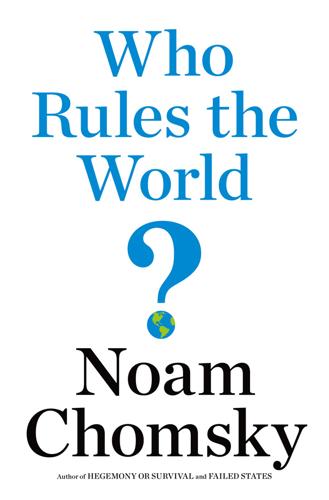
Who Rules the World?
by
Noam Chomsky
“‘Monster’ Greenhouse Gas Levels Seen,” Associated Press, 3 November 2011. 15. Noam Chomsky, Powers and Prospects (Chicago: Haymarket Books, 2015), 220. 16. John W. Dower, “The Superdomino In and Out of the Pentagon Papers,” in The Pentagon Papers: The Senator Gravel Edition, Volume 5, eds. Noam Chomsky and Howard Zinn (Boston: Beacon Press, 1972), 101–42. 17. Seymour Topping, “Slaughter of Reds Gives Indonesia a Grim Legacy,” New York Times, 24 August 1966. 18. James Reston, “A Gleam of Light in Asia,” New York Times, 19 June 1966. 19. David Sanger, “Why Suharto Is In and Castro Is Out,” New York Times, 31 October 1995. 20.
…
Published by Metropolitan Books, an imprint of Henry Holt and Company, its titles include Hegemony or Survival and Failed States by Noam Chomsky, The Limits of Power and Washington Rules by Andrew J. Bacevich, Blood and Oil by Michael T. Klare, Kill Anything That Moves by Nick Turse, A People’s History of American Empire by Howard Zinn, and Empire’s Workshop by Greg Grandin. For more information about the American Empire Project and for a list of forthcoming titles, please visit americanempireproject.com. Thank you for buying this Henry Holt and Company ebook. To receive special offers, bonus content, and info on new releases and other great reads, sign up for our newsletters.
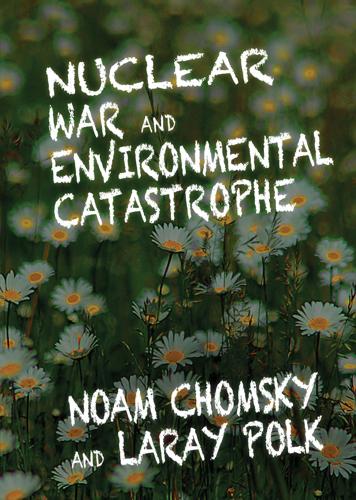
Nuclear War and Environmental Catastrophe
by
Noam Chomsky
and
Laray Polk
Published 29 Apr 2013
Butler, Ani DiFranco, Assia Djebar, Ariel Dorfman, Coco Fusco, Barry Gifford, Martha Long, Luis Negrón, Hwang Sok-yong, Lee Stringer, and Kurt Vonnegut, to name a few, together with political titles by voices of conscience, including Subhankar Banerjee, the Boston Women’s Health Collective, Noam Chomsky, Angela Y. Davis, Human Rights Watch, Derrick Jensen, Ralph Nader, Loretta Napoleoni, Gary Null, Greg Palast, Project Censored, Barbara Seaman, Alice Walker, Gary Webb, and Howard Zinn, among many others. Seven Stories Press believes publishers have a special responsibility to defend free speech and human rights, and to celebrate the gifts of the human imagination, wherever we can. In 2012 we launched Triangle Square books for young readers with strong social justice and narrative components, telling personal stories of courage and commitment.
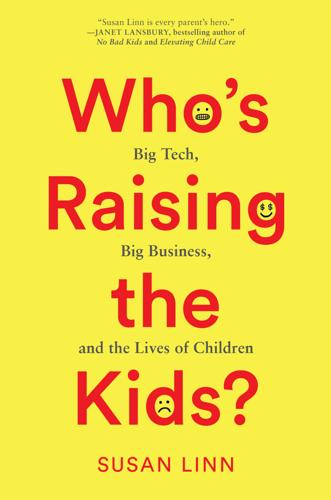
Who’s Raising the Kids?: Big Tech, Big Business, and the Lives of Children
by
Susan Linn
Published 12 Sep 2022
So did the National PTA, which has Google as a national sponsor.65 Deciding how we, as a society, choose the information that children should be taught in school is a herculean and complex task that goes well beyond the scope of this book. Every curriculum developer, textbook author, or creator of any kind of teaching materials has values and a point of view that influence the information they choose to provide to children and how to present it. As the late historian and educator Howard Zinn said, “In a world where justice is maldistributed, historically and now, there is no such thing as a ‘neutral’ or ‘representative’ recapitulation of facts.”66 That means the lessons we choose to teach students aren’t neutral—and those lessons matter.67 My point in writing about SEMs is not to consider whether progressive or conservative points of view should prevail in school curricula or which facts should or should not be included.
…
“Sponsors and Partners,” National PTA, www.pta.org/home/About-National-Parent-Teacher-Association/Sponsors-Partners. 66. For an excellent discussion of how and why what children learn in schools is never neutral and how that relates to commercialism, see Trevor Norris, Consuming Schools and the End of Politics (Toronto: University of Toronto Press, 2011), 48–60. 67. Howard Zinn, The Politics of History: With a New Introduction (Bloomington: University of Illinois Press, 1990), 24. CHAPTER 10: BIG TECH GOES TO SCHOOL Lisa Cline, email message to author, July 9, 2021. 1. Let’s Make a Sandwich, produced by Simmel-Meservey in collaboration with the American Gas Association (1950), www.youtube.com/watch?
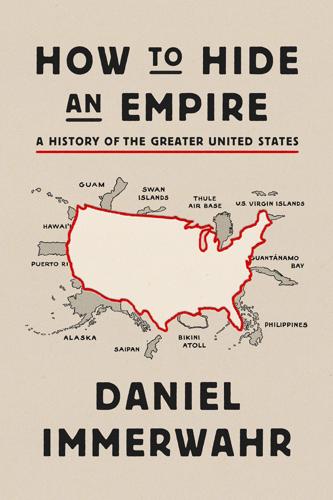
How to Hide an Empire: A History of the Greater United States
by
Daniel Immerwahr
Published 19 Feb 2019
“As a matter of fact, a lot of people do not know that we have overseas possessions. They are convinced that only ‘foreigners,’ such as the British, have an ‘empire.’ Americans are sometimes amazed to hear that we, too, have an ‘empire.’” * * * The proposition that the United States is an empire is less controversial today. The leftist author Howard Zinn, in his immensely popular A People’s History of the United States, wrote of the “global American empire,” and his graphic-novel spin-off is called A People’s History of American Empire. On the far right, the politician Pat Buchanan has warned that the United States is “traveling the same path that was trod by the British Empire.”
…
He’s not in comprehensive scholarly series such as the Oxford History of the United States or The New Cambridge History of American Foreign Relations, and I haven’t found a single textbook used in mainland schools that mentions him. Even books designed to uncover suppressed histories, such as Howard Zinn’s A People’s History of the United States and James Loewen’s Lies My Teacher Told Me, ignore Albizu. The most important academic venue in U.S. history, The Journal of American History, has never printed his name. Of course, Puerto Ricans themselves—on and off the island—are fully aware of Albizu.
…
official clarified: Ruth Hampton to Barbara Frederick, January 30, 1943, in ibid. 1910 report: U.S. Bureau of the Census, Thirteenth Census of the United States, vol. 1, Population: 1910 (Washington, DC, 1913), 17. “Most people”: Saul Padover, “The Overseas Expansion Policy of the U.S.,” c. 1943, “Reports” folder, box 12, Padover File. “global American empire”: Howard Zinn, A People’s History of the United States, 1492–Present, rev. ed. (New York, 1995), 492. “traveling the same path”: Patrick J. Buchanan, A Republic, Not an Empire: Reclaiming America’s Destiny (1999; Washington, DC, 2002), 6. case can be made: A helpful overview is Paul A. Kramer, “Power and Connection: Imperial Histories of the United States in the World,” American Historical Review (2011): 1348–91.
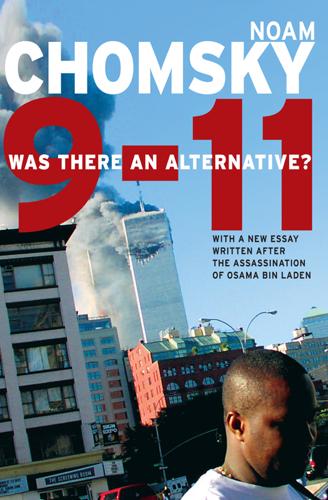
9-11
by
Noam Chomsky
Published 29 Aug 2011
Butler, Ani DiFranco, Assia Djebar, Ariel Dorfman, Coco Fusco, Barry Gifford, Lee Stringer, and Kurt Vonnegut, to name a few, together with political titles by voices of conscience, including the Boston Women’s Health Collective, Noam Chomsky, Angela Y. Davis, Human Rights Watch, Derrick Jensen, Ralph Nader, Gary Null, Project Censored, Barbara Seaman, Gary Webb, and Howard Zinn, among many others. Seven Stories Press believes publishers have a special responsibility to defend free speech and human rights, and to celebrate the gifts of the human imagination, wherever we can. For additional information, visit www.sevenstories.com. In 9-11, published in November 2001 and arguably the single most influential post-9-11 book, internationally renowned thinker Noam Chomsky bridged the information gap around the World Trade Center attacks, cutting through the tangle of political opportunism, expedient patriotism, and general conformity that choked off American discourse in the months immediately following.
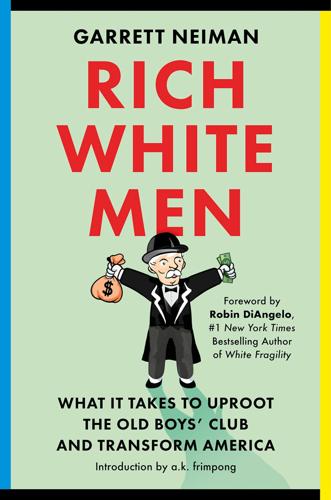
Rich White Men: What It Takes to Uproot the Old Boys' Club and Transform America
by
Garrett Neiman
Published 19 Jun 2023
“Victim blaming” has since become widely used jargon in the psychological field, and today the term describes any instance when the victim of a crime or any wrongful act is held entirely or partially at fault for the harm that befell them.14 In his book, Ryan argues that victim blaming is a rationalization that justifies social injustice in the United States.15 He wrote the book in part as a rebuke to United States senator Daniel Patrick Moynihan’s influential 1965 Moynihan Report, which claimed that racial disparities were caused at least in part by cultural deficiencies within the Black community.16 People of color are not the only people in America whose cultures and behaviors are pathologized. Americans in poverty are also blamed for their condition. “I’ve always resented the smug statements of politicians, media commentators, corporate executives who talked of how, in America, if you worked hard you would become rich,” historian Howard Zinn wrote.17 “The meaning of that was if you were poor it was because you hadn’t worked hard enough. I knew this was a lie, about my father and millions of others, men and women who worked harder than anyone, harder than financiers and politicians, harder than anybody if you accept that when you work at an unpleasant job that makes it very hard work indeed.”
…
The Canadian Resource Centre and for Victims of Crime, Victim Blaming, August 2009, https://crcvc.ca/docs/victim_blaming.pdf. 15. William Ryan, Blaming the Victim, rev. ed. (New York: Vintage, 1976). 16. U.S. Department of Labor, “The Negro Family: The Case for National Action,” U.S. Department of Labor, March 1965, https://www.dol.gov/general/aboutdol/history/webid-moynihan. 17. Howard Zinn, You Can’t Be Neutral on a Moving Train: A Personal History of Our Times (Boston: Beacon, 2002). 18. Jackson Katz, “Violence against Women: It’s a Men’s Issue,” TEDx Talk, TEDxFiDiWomen, November 2012, San Francisco, CA, video posted on TED.com, https://www.ted.com/talks/jackson_katz_violence_against_women_it_s_a_men_s_issue. 19.
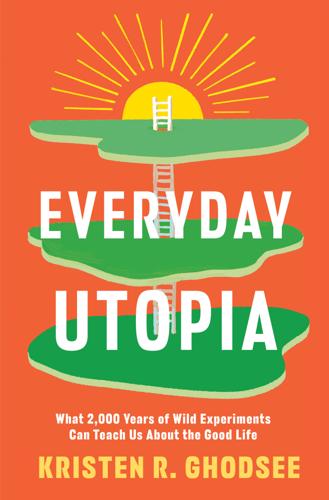
Everyday Utopia: What 2,000 Years of Wild Experiments Can Teach Us About the Good Life
by
Kristen R. Ghodsee
Published 16 May 2023
But similar visions have persisted over millennia, in many different cultural contexts, and we dismiss them at our peril. Part of developing our own cognitive capacities for hope involves a remembrance of the sometimes humble, sometimes astounding victories of the many social dreamers who came before us, victories that those who would uphold the status quo want us to forget. As the historian Howard Zinn reminds us: To be hopeful in bad times is not just foolishly romantic. It is based on the fact that human history is a history not only of cruelty, but also of compassion, sacrifice, courage, kindness. What we choose to emphasize in this complex history will determine our lives. If we see only the worst, it destroys our capacity to do something.
…
June 14, 2022, https://www.youtube.com/watch?v=n1xp50ZM_wk. 40 Kathi Weeks, The Problem with Work: Feminism, Marxism, Antiwork Politics, and Postwork Imaginaries (Durham, NC: Duke University Press, 2011). 41 Holly Jean Buck, After Geoengineering: Climate Tragedy, Repair, and Restoration (London and New York: Verso Books, 2019). 42 Howard Zinn, “The Optimism of Uncertainty,” The Nation, 2004, https://www.thenation.com/article/archive/optimism-uncertainty/. 43 Donna Haraway suggests that we should all be “making kin.” See Donna Haraway, “Anthropocene, Capitalocene, Plantationocene, Chthulucene: Making Kin,” Environmental Humanities 6 (2015): 159–65. 44 Gerda Lerner, The Creation of Patriarchy.
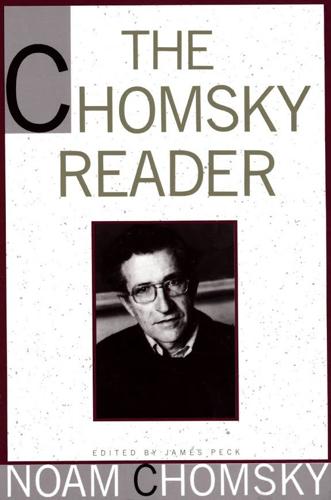
The Chomsky Reader
by
Noam Chomsky
Published 11 Sep 1987
The truth is not entirely suppressed. The distinguished Harvard historian and Columbus biographer Samuel Eliot Morrison does comment that “the cruel policy initiated by Columbus and pursued by his successors resulted in complete genocide.” This statement is “buried halfway into the telling of a grand romance,” Howard Zinn observes in his People’s History of the United States, noting that in the book’s last paragraph, Morrison sums up his view of Columbus as follows: He had his faults and his defects, but they were largely the defects of the qualities that made him great—his indomitable will, his superb faith in God and in his own mission as the Christ-bearer to lands beyond the seas, his stubborn persistence despite neglect, poverty and discouragement.
…
Cf. in particular Gabriel Kolko, The Roots of American Foreign Policy, (Boston: Beacon Press, 1969); the discussion in Gabriel and Joyce Kolko, The Limits of Power: The World and United States Foreign Policy, 1945–1954 (New York: Harper & Row, 1972); my At War with Asia (New York: Pantheon Books, 1970), chap. 1; and Committee of Concerned Asian Scholars, The Indochina Story (New York: Pantheon Books, 1970), pt. 3. See also the articles by John Dower, Richard Du Boff, and Gabriel Kolko in Noam Chomsky and Howard Zinn, eds., Critical Essays (Boston: Beacon Press, 1972), vol. 5 of the Pentagon Papers; see note 5, below. 2. See Walt W. Rostow and Richard W. Hatch, An American Policy in Asia, (Cambridge, Mass.: MIT Press, 1955), p. 7. In Rostow’s view, this “ideological threat to our interest … is as great as the military threat” posed by Communist China and the Soviet Union.
…
In Pfeffer, ed., No More Vietnams?, p. 18. On the widely noted analogy between Vietnam and the Indian wars, see my American Power and the New Mandarins, pp. 279–80, n. 42. 5. Harold B. Clifford, Exploring New England (New Unified Social Studies; Chicago: Follett Publishing Co., 1961). 6. See Howard Zinn, “Violence and Social Change,” Boston University Graduate Journal, Fall 1968. When disease decimated the Indians, Mather said: “The woods were almost cleared of those pernicious creatures, to make room for a better growth.” 7. On November 24, 1969. Attention, Mr. Agnew. 8. Christian Science Monitor, November 29, 1969. 9.
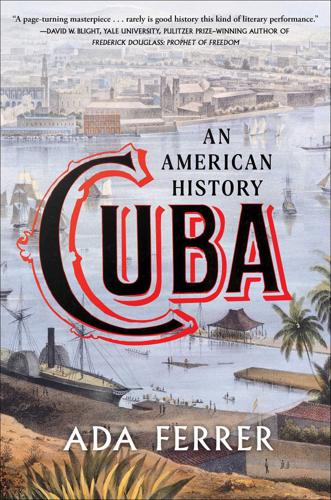
Cuba: An American History
by
Ada Ferrer
Published 6 Sep 2021
* * * THE HISTORY OF CUBA LENDS itself to monumental and epic tellings. It is a story of violent conquest and occupation; of conspiracies against slavery and colonialism; of revolutions attempted, victorious, and undone. Epic, however, is often the preferred narrative of nation-states. So in telling this history, I have tried to heed the late Howard Zinn’s admonition to not let history become the memory of states. I have also remembered Leo Tolstoy’s advice in his second epilogue to War and Peace to not focus our histories merely on monarchs and writers, but rather to tell “the history of the life of the peoples,” as he called it.1 So, in this history of Cuba, kings and presidents, revolutionaries and dictators share space with many others.
…
What Biden will actually do in office remains an open question. In any case, improvement in the day-to-day lives of Cuban people depends on more than the occupant of the White House. It depends, also, on how their own government responds to the crisis and how it charts—or doesn’t chart—a path forward. But it might be worth recalling Howard Zinn’s warning about history. It can never be understood only as the memory of states. Perhaps the same holds for the future. For, surely, it has to be something more than the sum of the actions of the two governments in question. The real question, then, is how much space the Cuban people will have to carve out the futures they want and deserve.
…
Click below to sign up and see terms and conditions. CLICK HERE TO SIGN UP Already a subscriber? Provide your email again so we can register this ebook and send you more of what you like to read. You will continue to receive exclusive offers in your inbox. NOTES Prologue: There and Here 1. Howard Zinn, A People’s History of the United States (New York: Harper Classics, 2005), 9–10; Leo Tolstoy, War and Peace (London: Wordsworth Classics, 1997), 939. 2. Louis A. Pérez, The War of 1898: The United States and Cuba in History and Historiography (Chapel Hill: University of North Carolina Press, 1998); Emilio Roig de Leuschenring, Cuba no debe su independencia a los Estados Unidos (Havana, 1950).
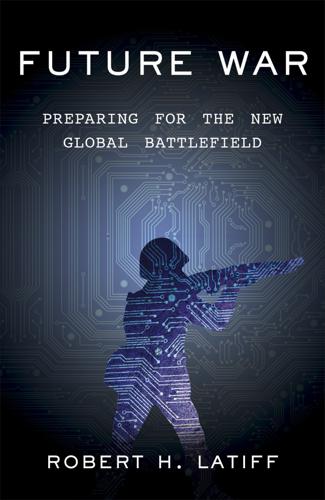
Future War: Preparing for the New Global Battlefield
by
Robert H. Latiff
Published 25 Sep 2017
The United States spends astronomical sums: Lauren Carroll, “Obama: US Spends More on Military Than Next 8 Nations Combined,” Politifact, January 13, 2016. The LRSO seems to be: Hams M. Kristensen, “LRSO: The Nuclear Cruise Missile Mission,” Federation of American Scientists, October 20, 2015. Worse yet are cases of shoddy workmanship: Howard Zinn, “Robber Barons and Rebels,” chapter 11 in History Is a Weapon: A People’s History of the United States (New York: HarperCollins, 1980). More recently, the Defense Department inspector general: James Risen, “Despite Alert, Flawed Wiring Still Kills G.I.’s,” The New York Times, May 4, 2008. A 2014 study by Bloomberg: Richard Clough, “U.S.
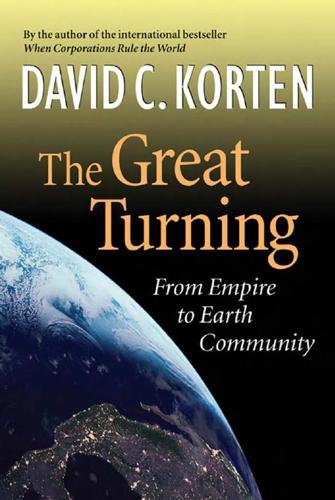
The Great Turning: From Empire to Earth Community
by
David C. Korten
Published 1 Jan 2001
.… As soon as I arrived in the Indies, on the first Island which I found, I took some of the natives by force in order that they might learn and might give me information of whatever there is in these parts.9 Similar reports of the generosity and egalitarianism of the Natives of North America from early European visitors and settlers were commonplace.10 Columbus responded by taking what gold he could find, killing those Natives who displeased him, and abducting others as specimens of the slaves he later promised to deliver to the Spanish crown in return for further support. 166 PART III: AMERIC A, THE UNFINISHED PROJECT It is instructive in light of the discussion of pre-Empire civilizations in chapter 5 that in this initial encounter between the “civilized” men of Europe and the “savages” of the pre-imperial tribes of the New World, the latter thought first of sharing their abundance. The former thought only of subjugating and enslaving the innocents and confiscating their gold by force of arms. According to the historian Howard Zinn, Columbus arrived in a world that in places “was as densely populated as Europe itself, where the culture was complex, where human relations were more egalitarian than in Europe, and where the relations among men, women, children, and nature were more beautifully worked out than perhaps any place in the world.”11 In many tribes, the systems of governance were more democratic than any encountered in the five-thousand-year experience of the empires that historians equate with civilization.
…
Frank Lambert, The Founding Fathers and the Place of Religion in America (Princeton, NJ: Princeton University Press, 2003), presents a detailed study of these early dynamics. NOTES 7. John Cotton in “Letter to Lord Say and Sele,” 1636, http://www .skidmore.edu/~tkuroda/hi321/ LordSay&Sele.htm. 8. Lambert, Founding Fathers and Religion, 92. 9. As quoted by Howard Zinn, A People’s History of the United States 1492–Present (New York: HarperPerennial, 1995), 1, 3. 10. Numerous such accounts are cited by Zinn, People’s History; Thom Hartmann, What Would Jefferson Do? A Return to Democracy (New York: Harmony Books, 2004); and Wasserman, America Born and Reborn. 11.
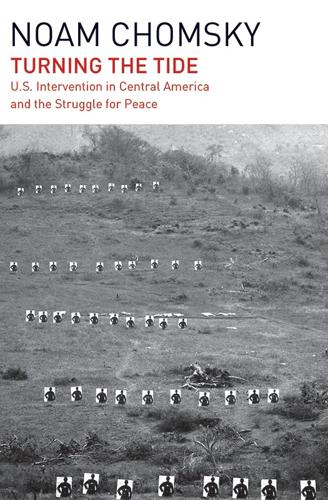
Turning the Tide
by
Noam Chomsky
Published 14 Sep 2015
.; the reporter cited is Chris Hedges, Dallas Morning News, Jan.21, 1985; Chris Norton, CSM, March 21, 1985; two of the few US journalists in Central America who merit the title. 59. James LeMoyne, NYT, Sept. 9, 1984. 60. Testimony before the Subcommittee on the Western Hemisphere, Feb. 2, 1984; released by Americas Watch. 61. Quoted by Howard Zinn, Disobedience and Democracy (Vintage, 1968), 75. 62. Julia Preston, BG, Aug. 15, 1985. 63. COHA News Release, Aug. 3,1985. 64. Cynthia Brown, ed., With Friends Like These, Americas Watch Report on Human Rights and US Policy in Latin America (Pantheon, 1985), 194, 180ff. 65. AI News release, 11 October, 1982, cited by Lars Schoultz, in Martin Diskin, ed., Trouble in Our Backyard (Pantheon, 1983), 186. 66.
…
Minutes summarizing PPS 51, April 1949, cited by Michael Schaller, “Securing the Great Crescent: Occupied Japan and the Origins of Containment in Southeast Asia,” J. of American History, Sept. 1982; the study also suggested that “some diversification of their economies” should be permitted. For fuller development of this topic, see Schaller; essays by John Dower and Richard Du Boff in Chomsky and Howard Zinn, eds., Critical Essays, vol. 5 of the Pentagon Papers (Beacon, 1972); For Reasons of State, chapter 1, V, 63. Perkins, I, 131, 167, 176f. The last phrase is Perkins’s summary of “a widespread, nay, almost general, viewpoint” among European statesmen. 64. See For Reasons of State, 37; PEHR, II; TNCW; Joel Charny and John Spragens, Obstacles to Recovery in Vietnam and Kampuchea: U.S.

Marx at the Arcade: Consoles, Controllers, and Class Struggle
by
Jamie Woodcock
Published 17 Jun 2019
These struggles continue today across the globe—struggles against oppression, exploitation, poverty, and war. Since our founding in 2001, Haymarket Books has published more than five hundred titles. Radically independent, we seek to drive a wedge into the risk-averse world of corporate book publishing. Our authors include Noam Chomsky, Arundhati Roy, Rebecca Solnit, Angela Y. Davis, Howard Zinn, Amy Goodman, Wallace Shawn, Mike Davis, Winona LaDuke, Ilan Pappé, Richard Wolff, Dave Zirin, Keeanga-Yamahtta Taylor, Nick Turse, Dahr Jamail, David Barsamian, Elizabeth Laird, Amira Hass, Mark Steel, Avi Lewis, Naomi Klein, and Neil Davidson. We are also the trade publishers of the acclaimed Historical Materialism Book Series and of Dispatch Books.
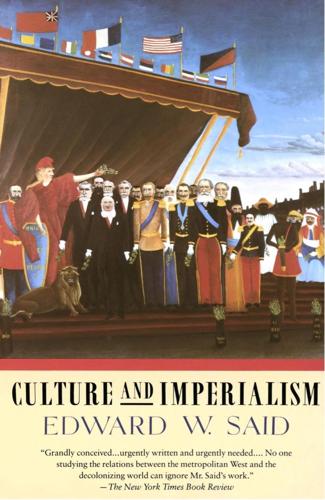
Culture and Imperialism
by
Edward W. Said
Published 29 May 1994
The roll call of names who have contributed to the discussion in Europe and America is impressive: Kautsky, Hilferding, Luxemburg, Hobson, Lenin, Schumpeter, Arendt, Magdoff, Paul Kennedy. And in recent years such works published in the United States as Paul Kennedy’s The Rise and Fall of the Great Powers, the revisionist history of William Appleman Williams, Gabriel Kolko, Noam Chomsky, Howard Zinn, and Walter Lefeber, and studious defenses or explanations of American policy as non-imperialist written by various strategists, theoreticians, and sages—all this has kept the question of imperialism, and its applicability (or not) to the United States, the main power of the day, very much alive.
…
Yet, in the case of Iraq, the United States used the United Nations Security Council to push through resolutions for war, at the same time that in numerous other instances (Israel’s chief among them) United Nations resolutions supported by the United States were unenforced or ignored, and the United States had unpaid dues to the United Nations of several hundred million dollars. Dissenting literature has always survived in the United States alongside the authorized public space; this literature can be described as oppositional to the overall national and official performance. There are revisionist historians such as William Appleman Williams, Gabriel Kolko, and Howard Zinn, powerful public critics like Noam Chomsky, Richard Barnet, Richard Falk, and many others, all of them prominent not only as individual voices but as members of a fairly substantial alternative and anti-imperial current within the country. With them go such Left-liberal journals as The Nation, The Progressive, and, when its author was alive, I.
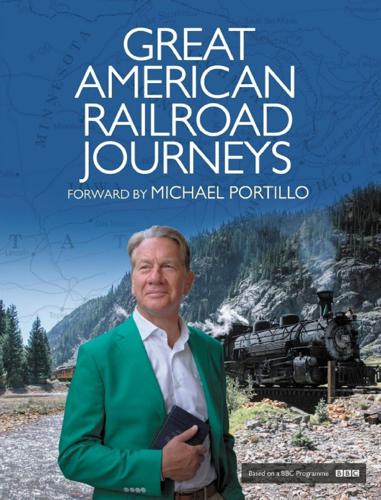
Great American Railroad Journeys
by
Michael Portillo
Published 26 Jan 2017
A ROGUES’ GALLERY Vanderbilt and Gould knew every ruse in the book when it came to making money. It’s tempting to believe their modest beginnings fired in them a deep desire for wealth and influence. But they were just two of numerous tricky entrepreneurs in an unwieldy and predatory pack. And, according to Howard Zinn in A People’s History of the United States: ‘While some multimillionaire robber barons started in poverty, most did not. A study of the origins of 303 textile, railroad and steel executives of the 1870s showed that 90 per cent came from middle-or upper-class families.’ So, what defined a ‘robber baron’?
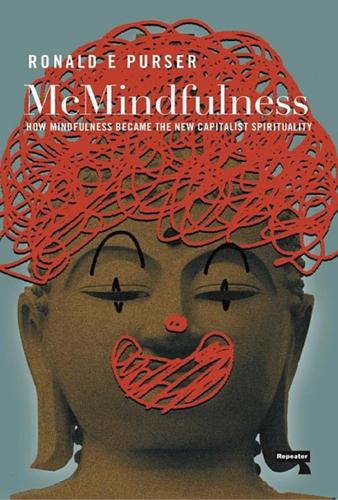
McMindfulness: How Mindfulness Became the New Capitalist Spirituality
by
Ronald Purser
Published 8 Jul 2019
This echoed his scientific predecessor, Herbert Benson, whose research had provided explanations for the efficacy of Transcendental Meditation (TM) in biomedical terms. Like Kabat-Zinn’s descriptions of MBSR, Benson framed the “relaxation response” as simply a “universal capacity of the body,” having no special allegiance to any religious or spiritual tradition.4 Kabat-Zinn is married to the daughter of the late radical historian and social activist Howard Zinn. But although he joined anti-Vietnam War protests in the late 1960s, his attention soon turned inward. He discovered Zen Buddhism while still a student at MIT, when he attended a talk by Philip Kapleau, and continued his foray into meditation under Korean Zen Buddhist teacher Seon Sahn at the Cambridge Zen Center.
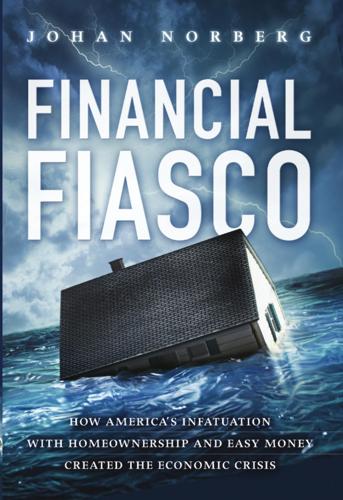
Financial Fiasco: How America's Infatuation With Homeownership and Easy Money Created the Economic Crisis
by
Johan Norberg
Published 14 Sep 2009
New York: Oxford University Press, 1999. Keynes, John Maynard. The General Theory of Employment, Interest, and Money. 1935. http:/ /www.scribd.com/doc/11392072/The-General-Theory-of-Employment- Interest-and-Money. . "The Maintenance of Prosperity Is Extremely Difficult." In New Deal Thought, edited by Howard Zinn, pp. 403-9. Indianapolis: Bobbs-Merrill, 1966. Keys, Benjamin, Tanmoy Mukherjee, Amit Seru, and Vikrant Vig. "Did Securitization Lead to Lax Screening? Evidence from Subprime Loans." European Finance Association 2008 Athens meetings paper, April 2008. Kindleberger, Charles, and Robert Z. Aliber.
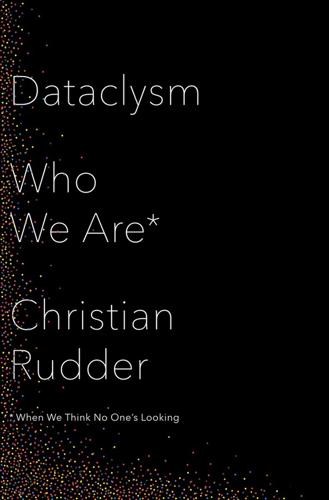
Dataclysm: Who We Are (When We Think No One's Looking)
by
Christian Rudder
Published 8 Sep 2014
Google Books describes it well: it’s a chronicle of “American history from the bottom up”—and where most books treat leaders and big events, A People’s History shows us the homes, shops, farms, factories, and smaller worries of yesteryear. The thing is, as much as I love that book, and as much as it turns the schoolhouse version of American history on its head, Howard Zinn could still only tell us what he could see, the observable actions, the words spoken aloud. The hearts of women and men were beyond him. In the stress of the Cuban Missile Crisis, in the boredom of the trenches, in the liberation of the Pill—for all the moments of quiet joy and interior anguish lost to history, what if we had the data we have now?
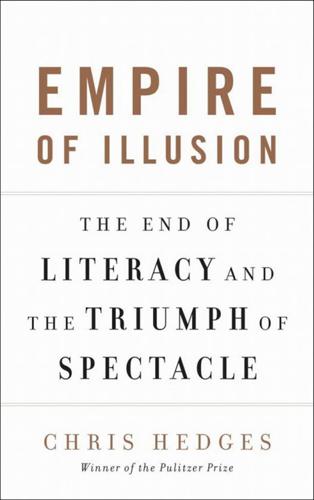
Empire of Illusion: The End of Literacy and the Triumph of Spectacle
by
Chris Hedges
Published 12 Jul 2009
It dices disciplines, faculty, students, and finally experts into tiny, specialized fragments. It allows students and faculty to retreat into these self-imposed fiefdoms and neglect the most pressing moral, political, and cultural questions. Those who critique the system itself—people such as Noam Chomsky, Howard Zinn, Dennis Kucinich, or Ralph Nader—are marginalized and shut out of the mainstream debate. These elite universities have banished self-criticism. They refuse to question a self-justifying system. Organization, technology, self-advancement, and information systems are the only things that matter. In 1967, Theodor Adorno wrote an essay titled “Education After Auschwitz.”
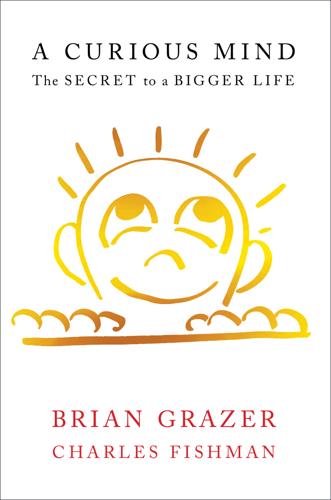
A Curious Mind: The Secret to a Bigger Life
by
Brian Grazer
and
Charles Fishman
Published 6 Apr 2014
Wren: president and CEO of marketing and communications company Omnicom Will Wright: game designer, creator of Sim City and The Sims Steve Wynn: businessman, Las Vegas casino magnate Gideon Yago: writer, former correspondent for MTV News Eitan Yardeni: teacher and spiritual counselor at the Kabbalah Centre Daniel Yergin: economist, author of The Prize: The Epic Quest for Oil, Money and Power, winner of the Pulitzer Prize Dan York: chief content officer at DirecTV, former president of content and advertising sales, AT&T Michael W. Young: geneticist, professor at The Rockefeller University, specializing in the biological clock and circadian rhythms Shinzen Young: meditation teacher Eran Zaidel: neuropsychologist, professor at UCLA, expert in hemispheric interaction in the human brain Howard Zinn: historian, political scientist, professor at Boston University, author of A People’s History of the United States Appendix: How to Have a Curiosity Conversation * * * We’ve talked throughout A Curious Mind about how to use questions, how to use curiosity, to make your daily life better.
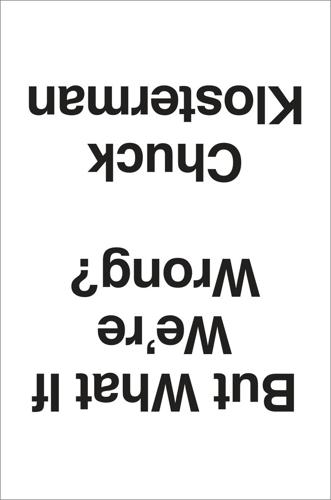
But What if We're Wrong? Thinking About the Present as if It Were the Past
by
Chuck Klosterman
Published 6 Jun 2016
Things that seem obvious now—the conscious racism of Nixon’s “Southern Strategy,” the role the CIA played in the destabilization of Iran, how payola controlled what was on FM radio, the explanation behind America’s reliance on privately owned cars instead of public transportation, et al.—were all discussed while they were happening . . . but only on the marginalized periphery. They were not taken that seriously. Over time, these shadow ideas—or at least the ones that proved factually irrefutable—slowly became the mainstream view. Howard Zinn’s 1980 depiction of how America was built in A People’s History of the United States is no longer a counterbalance to a conventional high school history text; in many cases, it is the text. This kind of transition has become a normal part of learning about anything. In literature, there were the established (white, male) classics that everyone was forced to identify as a senior in high school.

Drinking in America: Our Secret History
by
Susan Cheever
Published 12 Oct 2015
In spite of Hamilton’s tantrum politics, the story had a happy ending except for those who had been killed or wounded or permanently traumatized by fear. “The new government had displayed both its resolution and its capacity for mercy,” writes Smith.84 Other historians are not so forgiving about the Whiskey Rebellion and its aftermath. “We see then,” writes historian Howard Zinn, “in the first years of the Constitution, that some of its provisions—even those paraded most flamboyantly (like the First Amendment)—might be treated lightly. Others (like the power to tax) would be powerfully enforced.”85 Thomas Jefferson, who ran for election in 1800 using the repeal of the whiskey tax as a campaign platform, was slightly more scathing in a letter to James Monroe.
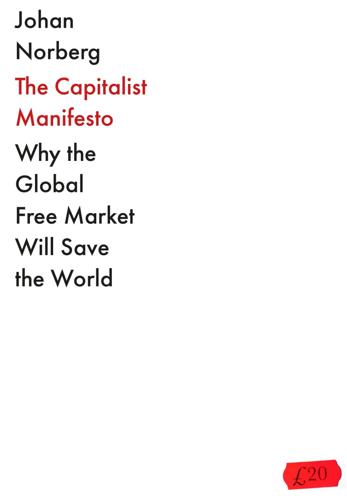
The Capitalist Manifesto
by
Johan Norberg
Published 14 Jun 2023
Bernie Sanders said that the American dream was more alive in Venezuela than in the US. Labour’s Jeremy Corbyn praised Chávez for showing that ‘the poor matter and wealth can be shared’. Oxfam called Venezuela ‘Latin America’s inequality success story’. In an open letter to ‘Dear President Chávez’, luminaries of the Left such as Jesse Jackson, Naomi Klein, Howard Zinn and others state that they ‘see Venezuela not only as a model democracy but also as a model of how a country’s oil wealth can be used to benefit all of its people.’36 On paper, that $1,000 billion was enough to make every extremely poor individual in Venezuela a millionaire. But still, it is not much money if you do not invest it productively and if you destroy the ability to create new wealth with nationalization and price controls.

Health and Safety: A Breakdown
by
Emily Witt
Published 16 Sep 2024
I think also it had to do with the politics of the city, but every time I tried to articulate what those politics were I could only come up with decades-old memories—of being one of the only kids on the school bus on the day of the Million Man March; of the eighth-grade teacher who went to Rainbow Gatherings, assigned us Howard Zinn, and had invited anarchist punks as guest lecturers; of Rhymesayers showcases at 7th St Entry full of teenagers wearing puffy coats and bobbing their heads in unison, sketchpads of graffiti designs in their backpacks; of the camp counselor who would feed her plants with the wash water of her reusable menstrual pads; of the May Day parade each spring in Powderhorn Park, where puppet effigies of bankers and pharmaceutical executives were chased away by the pagan gods of spring; of my childhood classmates who became Five Percenters in high school, wore headscarves, and explained theories of Black nationalism; of the militant vegan, the daughter of a member of the Replacements, who had converted me to vegetarianism at fourteen; of KMOJ, “your power station”; of our childhood friends who had gone on to chain themselves to trees and fight in the Battle in Seattle, the antiglobalization protests of 2001; of the crust punks and bicycle punks and straight-edge punks and freight-train punks and antiracist punks.
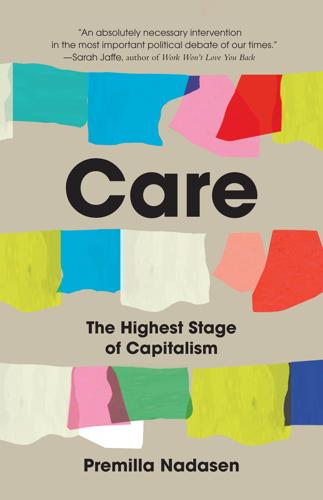
Care: The Highest Stage of Capitalism
by
Premilla Nadasen
Published 10 Oct 2023
Radically independent, we seek to drive a wedge into the risk-averse world of corporate book publishing. Our authors include Angela Y. Davis, Arundhati Roy, Keeanga-Yamahtta Taylor, Eve L. Ewing, Aja Monet, Mariame Kaba, Naomi Klein, Rebecca Solnit, Olúfé․mi O. Táíwò, Mohammed El-Kurd, José Olivarez, Noam Chomsky, Winona LaDuke, Robyn Maynard, Leanne Betasamosake Simpson, Howard Zinn, Mike Davis, Marc Lamont Hill, Dave Zirin, Astra Taylor, and Amy Goodman, among many other leading writers of our time. We are also the trade publishers of the acclaimed Historical Materialism Book Series. Haymarket also manages a vibrant community organizing and event space in Chicago, Haymarket House, the popular Haymarket Books Live event series and podcast, and the annual Socialism Conference.
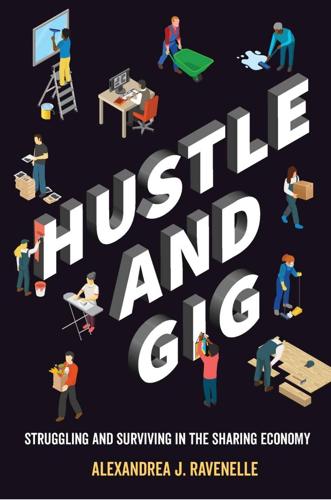
Hustle and Gig: Struggling and Surviving in the Sharing Economy
by
Alexandrea J. Ravenelle
Published 12 Mar 2019
The fellow servant exemption provided a loophole for any injury caused by a fellow employee, and, when all else failed, there was the assumption of risk—the claim that by performing a job, employees assumed any risk that was inherent in the job.5 Historically, work in the United States was fairly dangerous. In 1904, twenty-seven thousand workers in manufacturing, transport, and agriculture were killed on the job. In one year, fifty thousand accidents took place in New York factories alone. Historian Howard Zinn notes that “hat and cap makers were getting respiratory diseases, quarrymen were inhaling deadly chemicals, lithographic printers were getting arsenic poisoning.” In 1914, according to a report of the Commission on Industrial Relations, thirty-five thousand workers were killed in industrial accidents and seven hundred thousand were injured.6 Populist support for an organized workers movement began to grow in the first decade of the twentieth century, assisted by the “muckrakers” movement of reform-minded journalists.

Fresh Off the Boat
by
Eddie Huang
Published 29 Jan 2013
I didn’t take shit from anyone at this point. I only had one rule: don’t pick on people who were already being picked on. One school got so sick of Emery and me that they demanded we get psychological counseling before we could go back. We had good grades, but we disrupted class telling jokes or arguing with teachers. I didn’t need Howard Zinn to know Christopher Columbus was a punk-ass stealing from colored people and I let it be known. Emery was a beast, too. I started lifting weights and he did it with me. He wasn’t even eleven years old when he started. I think it stunted his growth, but by the time the boy hit eighth grade he was Megatron just stompin’ out the other kids that fucked with him.
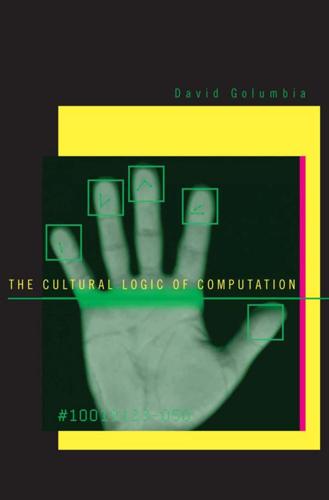
The Cultural Logic of Computation
by
David Golumbia
Published 31 Mar 2009
Writing of an RTS-based world history game that has substantially more cultural flexibility than Age of Empires, the Civilization series developed by Sid Meier, Alex Galloway suggests that “the more one begins to think that Civilization is about a certain ideologically interpretation of history (neoconservative, reactionary, or what have you), or even that it creates a computer-generated ‘history effect,’ the more one realizes that it is about the absence of history of altogether, or rather, the transcoding of history into specific mathematical models” (Galloway 2006, 102–3). “ ‘History’ in Civilization is precisely the opposite of history,” Galloway writes, “not because the game fetishizes the imperial perspective, but because the diachronic details of lived life are replaced by the synchronic homogeneity of code pure and simple. It is a new sort of fetish altogether. (To be entirely clear: mine is an argument about informatic control, not about ideology: a politically progressive ‘People’s Civilization’ game, a la Howard Zinn, would beg the same critique)” (ibid., 103). Despite the fact that Galloway sees some of the inherent ideological commitments in the RTS genre, this view gives in to exactly the neoliberal/progressivist/neoconservative view that technology can stand outside of history and that computational processes are themselves synchronic, abstract, and deserving of new analytic methods and frames to be understood—exactly what I am arguing here is untrue.
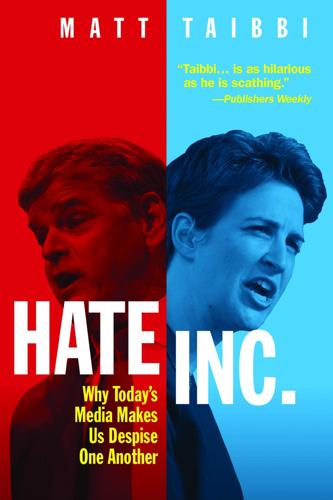
Hate Inc.: Why Today’s Media Makes Us Despise One Another
by
Matt Taibbi
Published 7 Oct 2019
It’s the assumption that you’re being adversarial, independent, questioning everything, and so on. But it’s the same in scholarship. If you tell a scholar, “Look you’re just conforming to ideological prejudices,” they go crazy. You can see what happened when something really became prominent that questioned the basic ideological framework. Like when Howard Zinn’s book… Taibbi: The People’s History of the United States. Chomsky: Right. When that became popular, historians just went berserk. There’s a very interesting book that just came out about that, if you want to take a look. Taibbi: Is there? I didn’t know. Chomsky: It’s called Zinnophobia... It’s a very careful analysis of Oscar Handlin, and all the guys who bitterly attacked the Zinn report.
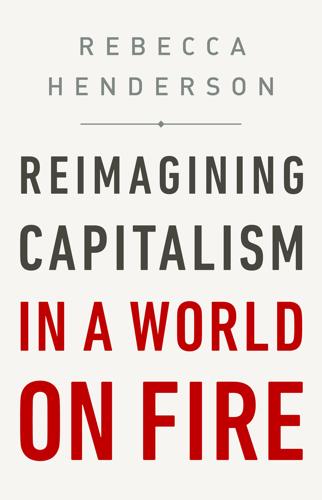
Reimagining Capitalism in a World on Fire
by
Rebecca Henderson
Published 27 Apr 2020
If we remember those times and places—and there are so many—where people have behaved magnificently, this gives us the energy to act, and at least the possibility of sending this spinning top of a world in a different direction. And if we do act, in however small a way, we don’t have to wait for some grand utopian future. The future is an infinite succession of presents, and to live now as we think human beings should live, in defiance of all that is bad around us, is itself a marvelous victory. —HOWARD ZINN, YOU CAN’T BE NEUTRAL ON A MOVING TRAIN, 1994 One small step for a man, one giant leap for mankind. —NEIL ARMSTRONG What will a reimagined capitalism look like? It’s impossible to know, of course, but at the risk of seeming utopian, let me paint a picture of how the world might look very different twenty years from now.

The Undertow: Scenes From a Slow Civil War
by
Jeff Sharlet
Published 21 Mar 2023
It began as a row of boxes containing donated books, mostly well-used paperbacks like my Pagan Rabbi, and it became a row of tables alongside the northeast corner of the park, a collection of several thousand—cataloguing was as never-ending as the stream of donations—maintained by a group of volunteer librarians, one of whom slept on an air mattress beside the reference desk. He wasn’t there as a guard: At this library, books were free for the taking. Howard Zinn’s A People’s History of the United States got taken almost as fast as it could be shelved. My Pagan Rabbi, I’m guessing, had been lingering for a while, tucked between a romance novel and a mass-market paperback of A Canticle for Leibowitz, a 1960 sci-fi classic about a monastic order dedicated to the preservation of books in a postapocalyptic age.
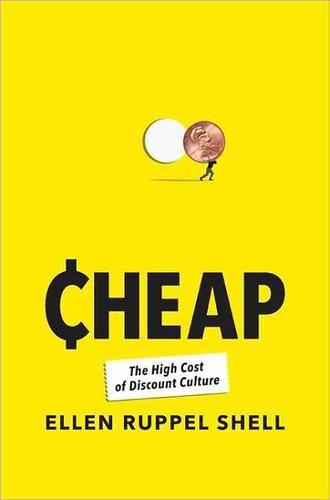
Cheap: The High Cost of Discount Culture
by
Ellen Ruppel Shell
Published 2 Jul 2009
He argued that those British workers who had been able to establish unions and secure stable employment—skilled workers in the iron, steel, and machine making-industries and most workers in the cotton textile mills—constituted a privileged and “bourgeoisified” layer of the working class, a “labor aristocracy.” 161 cheap goods cannot be had without “cheap help”: Howard Zinn, Dana Frank, and Robin D. G. Kelly, Three Strikes, Miners, Musicians, Salesgirls, and the Fighting Spirit of Labor’s Last Century (Boston: Beacon Press, 2001), 70. 161 “Does Wal-Mart Sell Inferior Goods?”: Emek Basker, “Does Wal-Mart Sell Inferior Goods?” University of Missouri Department of Economics Working Paper 08-05, April 2008. 161 beating Wall Street estimates: “Wal-Mart June Sales up; Raises Earnings Forecast,” Reuters, July 10, 2008. 161 also enjoyed sales growth: Michael Barbaro, “Discounters Fared Well in Quarter,” New York Times, May 14, 2008. 162 benefit both its workers and its core clientele: Interview with Nelson Lichtenstein, July 2006. 162 “is market potential unrealized”: Larry Copeland, “Wal-Mart’s Hired Advocate Takes Flak,” USA Today, March 15, 2006.

The Boy Who Could Change the World: The Writings of Aaron Swartz
by
Aaron Swartz
and
Lawrence Lessig
Published 5 Jan 2016
And then, to top it all off, he said he didn’t believe in objective truth! Teaching one point of view, the lady concludes, is like a pedophile giving advance warning: it’s not OK. (In reality, it’s pretty obvious the guy simply gave a partway accurate description of Palestinian history and then probably echoed Howard Zinn’s comment that “any chosen emphasis supports [whether the historian means to or not] some kind of interest.” So did she just compare all mainstream historians to pedophiles?) An actual student follows the lady and thanks all the funding groups: the Stanford Jewish-American Alliance, Hillel, Chabad, Young America’s Foundation.
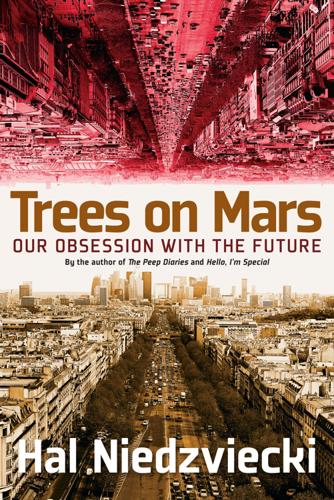
Trees on Mars: Our Obsession With the Future
by
Hal Niedzviecki
Published 15 Mar 2015
Butler, Ani DiFranco, Assia Djebar, Ariel Dorfman, Coco Fusco, Barry Gifford, Martha Long, Luis Negrón, Hwang Sok-yong, Lee Stringer, and Kurt Vonnegut, to name a few, together with political titles by voices of conscience, including Subhankar Banerjee, the Boston Women’s Health Collective, Noam Chomsky, Angela Y. Davis, Human Rights Watch, Derrick Jensen, Ralph Nader, Loretta Napoleoni, Gary Null, Greg Palast, Project Censored, Barbara Seaman, Alice Walker, Gary Webb, and Howard Zinn, among many others. Seven Stories Press believes publishers have a special responsibility to defend free speech and human rights, and to celebrate the gifts of the human imagination, wherever we can. In 2012 we launched Triangle Square books for young readers with strong social justice and narrative components, telling personal stories of courage and commitment.
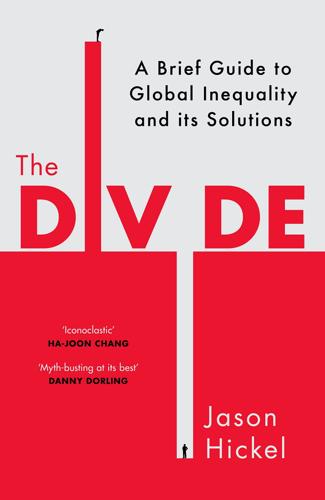
The Divide: A Brief Guide to Global Inequality and Its Solutions
by
Jason Hickel
Published 3 May 2017
The figure for the English working class comes from Edwin Chadwick’s report on The Sanitary Condition of the Labouring Population, cited in Friedrich Engels, The Condition of the Working Class in England in 1844 (1845). 5 ‘In fact, by the time …’ Immanuel Wallerstein, The Modern World System (New York: Academic Press, 1974). 6 ‘In his journals, Columbus reported …’ Quoted in Howard Zinn, A People’s History of the United States (New York: HarperCollins, 2003), 3. 7 ‘They lived in communal buildings …’ Quoted in Zinn, A People’s History, p. 1. 8 ‘Columbus was eager to exploit …’ Quoted in Zinn, A People’s History, p. 1. 9 ‘“They lifted up the gold …”’ Quoted in Eduardo Galeano, ‘Open Veins of Latin America’, Monthly Review Press, 1973, pp. 18–19. 10 ‘Before long the metal …’ Galeano, ‘Open Veins’, p. 22. 11 ‘And that was on top …’ Galeano, ‘Open Veins’, p. 23. 12 ‘By the early 1800s …’ Timothy Walton, The Spanish Treasure Fleets (Florida: Pineapple Press, 1994). 13 ‘It was a massive infusion …’ The silver was ‘free’ in the sense that it was dug up by unpaid slave labour.
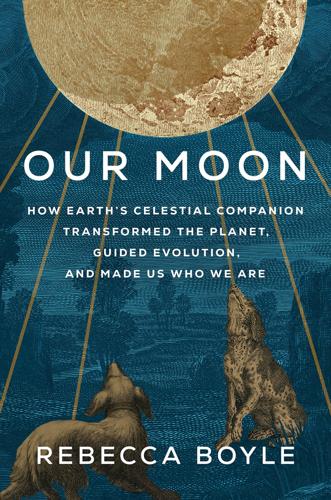
Our Moon: How Earth's Celestial Companion Transformed the Planet, Guided Evolution, and Made Us Who We Are
by
Rebecca Boyle
Published 16 Jan 2024
The first seeds of this book germinated in the Peakview Elementary School library, where I sat on the floor as a student and listened to the Apollo 11 recordings. I am indebted to my history teachers, especially Doug Chilton, who first taught me about the Sumerians; Deborah Milliser, who gave me Howard Zinn when I was sixteen; and Elizabeth Jones, who showed me new perspectives on Western history. I am also grateful to Susan Wise Bauer for reminding me that history writing can be stylish and fun as well as comprehensive. And I am grateful to my parents, for encouraging me in all things but especially for fostering my love of books and of space for as long as I can remember.
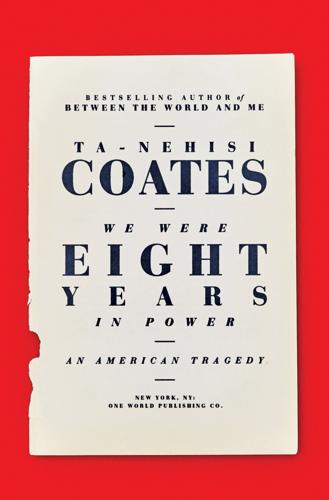
We Were Eight Years in Power: An American Tragedy
by
Ta-Nehisi Coates
Published 2 Oct 2017
I wanted to maximize the number of commenters who could tell me things, and for that I had to build something beyond the profane cynicism that inevitably overruns any unregulated space. Between all the posts about Rakim and Spider-Man, I would write about my attempts to conquer Leviathan or my reconsiderations of Howard Zinn, and the commenters would offer their responses. We would engage, sometimes argue, and I would learn. Grad students would show up under anonymous handles, offering contexts, objections, and clarifications. A kind of seminar evolved in which scholars dead and present—Beryl Satter, Rebecca Scott, Primo Levi, John Locke—became my virtual professors.
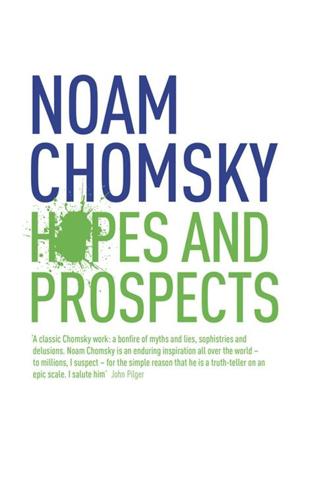
Hopes and Prospects
by
Noam Chomsky
Published 1 Jan 2009
In late 1967, when opposition to the war was finally becoming a mass popular movement, the ADA leadership undertook considerable (and quite comical) efforts to prevent applications for membership from people they feared would speak in favor of an antiwar resolution sponsored by a local chapter that had fallen out of control (Howard Zinn and I were the terrifying applicants). A few months later came the Tet offensive, leading the business world to turn against the war because of its costs to us, while the more perceptive were coming to realize that Washington had already achieved its major war aims: destroying the “virus” of successful independent development that might “spread contagion” throughout the region, to borrow Kissingerian rhetoric, and inoculating the potential victims by imposing vicious dictatorships.4 It soon turned out that everyone had always been a strong opponent of the war (in deep silence).
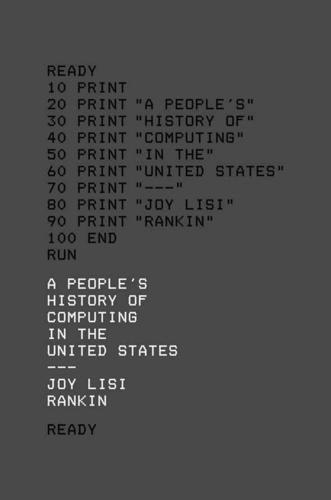
A People’s History of Computing in the United States
by
Joy Lisi Rankin
And the Minnesota software library, mostly BASIC programs including The Oregon Trail, proved to be the ideal complement for the hardware of Apple Computers. During the 1980s, the combination of Apple hardware and MECC software 10 A People’s History of Computing in the United States cemented the transformation from computing citizens to computing consumers. The title of this work nods to Howard Zinn’s groundbreaking A People’s History of the United States. Published nearly forty years ago, Zinn’s book channeled the energies of the social and political movements of the long 1960s and the ensuing outpouring of social history to write a new kind of American history. Zinn did not write about Founding Fathers and presidents, captains of industry, war heroes, and other influential white men.
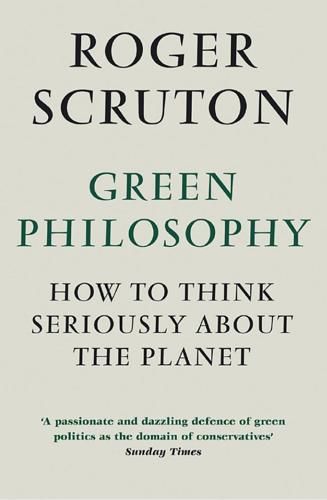
Green Philosophy: How to Think Seriously About the Planet
by
Roger Scruton
Published 30 Apr 2014
This contempt is the dominant theme of French intellectual life, to be found in all the fashionable nonsense, from Iragaray to Cixous, and from Deleuze to Kristeva, that has spread from the rive gauche to humanities departments around the world.258 A chronic form of oikophobia has also spread through the American universities, and is encapsulated in the speeches and writings of Noam Chomsky and Howard Zinn. What is normally meant by ‘political correctness’ is the repudiation of rooted American values, and a pronounced tendency to blame America and its success for all that is wrong with the world. In all its versions oikophobia gives rise to what I call a ‘culture of repudiation’, which spreads through school and academy all but unresisted by the guardians of traditional knowledge.259 The roots of oikophobia lie deeper than reason, and it is unlikely that any argument will eradicate it or do anything more, in the eyes of the oikophobe, than to discredit the person who presents it.
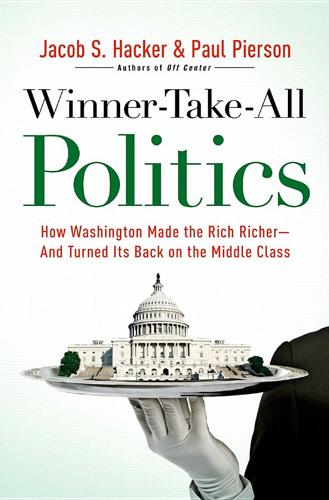
Winner-Take-All Politics: How Washington Made the Rich Richer-And Turned Its Back on the Middle Class
by
Paul Pierson
and
Jacob S. Hacker
Published 14 Sep 2010
(New York: Basic Books, 1985), 203. 24 “Filibuster Kills Labor Law ‘Reform’ Bill,” CQ Almanac 1978 (Washington: Congressional Quarterly, 1979). 25 Freeman and Medoff, What Do Unions Do?, 203. 26 “Filibuster Kills Labor Law ‘Reform’ Bill,” CQ Almanac 1978. 27 Edsall, New Politics of Inequality, 125. 28 Quoted in Howard Zinn and Anthony Arnove, Voices of a People’s History of the United States, 2nd ed. (New York: Seven Stories Press, 2009), 530–33. 29 Frank Levy and Peter Temin, “Inequality and Institutions in Twentieth Century America,” NBER Working Paper No. 13106 (May 2007). 30 Thomas Ferguson and Joel Rogers, Right Turn: The Decline of the Democrats and the Future of American Politics (New York: Hill and Wang, 1986), 109. 31 Blumenthal, Rise of the Counter-Establishment, 81. 32 David O.
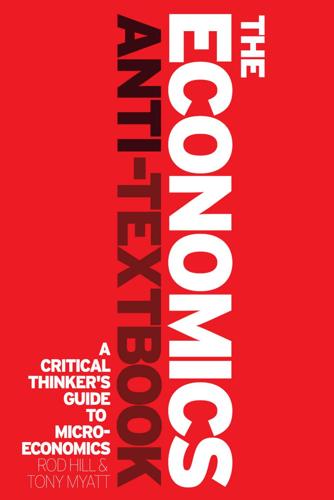
The Economics Anti-Textbook: A Critical Thinker's Guide to Microeconomics
by
Rod Hill
and
Anthony Myatt
Published 15 Mar 2010
As we’ve tried to show, it’s perfectly compatible with very serious problems of pollution (of which we have given only a few examples), misuse of resources, and even with long-term catastrophe. 167 7 | Externalities Many critics of the current economic system deplore the profit motive, seeing it as destructive. From the viewpoint of the textbooks, where the profit motive guides resources to their most valued uses and produces material abundance, it appears that these critics are economic illiterates. Consider this comment by the American historian Howard Zinn: In fact, this does not contradict what is in the texts themselves, if they are read carefully and completely by those willing to draw their own conclusions. But the texts put externalities in the background (and at the back of the book), foregrounding instead the story of markets that work efficiently.

The Bookshop: A History of the American Bookstore
by
Evan Friss
Published 5 Aug 2024
* * * — The customers, almost all of whom had never been in a store like this, didn’t know where to begin. Drum & Spear’s stock was certainly deep: Eldridge Cleaver, Frantz Fanon, Frederick Douglass, Alex Haley, Langston Hughes, W. E. B. Du Bois, Paul Robeson, Richard Wright, Karl Marx, and James Baldwin. Works by academic historians, including Eugene Genovese, James McPherson, and Howard Zinn, were on sale, too. None of those scholars had an asterisk by their name in the thirty-seven-page catalog. Asterisks were reserved for Black authors. On opening night, a large crowd gathered to celebrate. It included poet LeRoi Jones (later known as Amiri Baraka) and Stokely Carmichael, then the immediate former SNCC chairman and one of the three activists whom FBI director J.
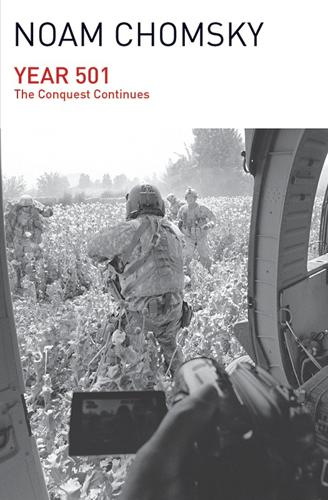
Year 501
by
Noam Chomsky
Published 19 Jan 2016
American Power and the New Mandarins (Pantheon, 1969) [APNW] —At War With Asia (Pantheon, 1970) [AWWA] —For Reasons of State (Pantheon, 1973) [FRS] —Towards a New Cold War (Pantheon, 1982) [TNCW] —Fateful Triangle (South End, 1983) [FT] —Turning the Tide (South End, 1985) [TTT] —Pirates and Emperors (Claremont, Black Rose, 1986; Amana, 1988) [P&E] —On Power and Ideology (South End, 1986) [PI] —Culture of Terrorism (South End, 1988) [CT] —Necessary Illusions (South End, 1989) [NI] —Deterring Democracy (Verso, 1990; updated edition, Hill & Wang, 1991) [DD] —Rethinking Camelot, (South End Press, 1993) [RC] —, and Edward Herman. Political Economy of Human Rights (South End, 1979) [PEHR] —and Howard Zinn, eds. Pentagon Papers, vol. 5, Analytic Essays and Index (Beacon, 1972) [PPV] Clairmonte, Frederick. Economic Liberalism and Underdevelopment (Asia Publishing House, 1960) Cooper, Chester. The Lost Crusade (Dodd, Mead, 1970) Cumings, Bruce. The Origins of the Korean War, vol. II (Princeton, 1990) Daws, Gavan, Shoal of Time (Macmillan, 1968) Debo, Angie.

Vertical: The City From Satellites to Bunkers
by
Stephen Graham
Published 8 Nov 2016
Then searchlights above and ack-ack [anti-aircraft shells] around you. There was always a weird feeling of unreality in Bomber Command. You were living in, say, Cambridgeshire or Norfolk; you were thinking of friends, pubs, girls, even intellectual pursuits. Then you launched for 8 hours into a different world at 20,000 ft. over Germany.28 Historian Howard Zinn, prompted by Elin O’Hara Slavick’s extraordinary artworks mapping the diverse sites and cities across the world bombed by the US Air Force over the last century,29 comments on how darkly ironic it is that her abstract and ‘God’s-eye’ maps – so apparently similar to the aerial surveys and photographs that sustained bombing campaigns – should powerfully evoke the visceral and bloody horror at ground level.
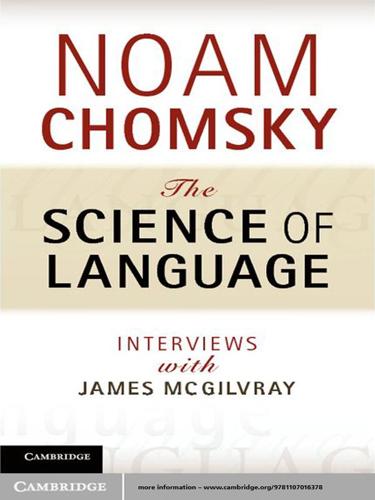
The Science of Language
by
Noam Chomsky
Published 24 Feb 2012
If you go to Finland – Carol and I noticed as soon as we were there – they just walk differently. These older women carrying shopping bags racing down the streets; we could barely keep up. It's just the way they walk. People just pick that up. I remember once when Carol and I were walking down the streets in Wellfleet [Massachusetts] one summer and Howard Zinn was walking in front of us, and right next to him was his son, Jeff Zinn. And the two of them had exactly the same posture. Children just pick these things up. If people really studied things like styles of walking, I'm sure that they'd find something like dialect variation. Think about it: you can identify somebody who grew up in England just by mannerisms.
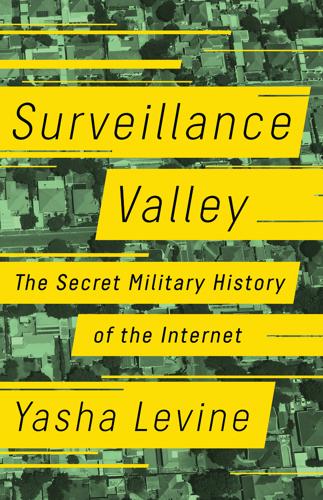
Surveillance Valley: The Rise of the Military-Digital Complex
by
Yasha Levine
Published 6 Feb 2018
He saw the whole thing as a symptom of the degradation of American youth culture. The demonstrations against the Cambridge Project involved hundreds of people. They were ultimately a part of the larger antiwar movement at MIT and Harvard that attracted the leading lights of the antiwar movement, including Howard Zinn. Noam Chomsky showed up to lambast academics, accusing them of running cover for violent imperialism by “investing it with the aura of science.”96 But in the end, the protests didn’t have much of an effect. The Cambridge Project proceeded as planned. The only change: further proposals and internal discussions for funding omitted overt references to military applications and the study of communism and third world societies, and project contractors simply referred to what they were doing as “behavioral science.”
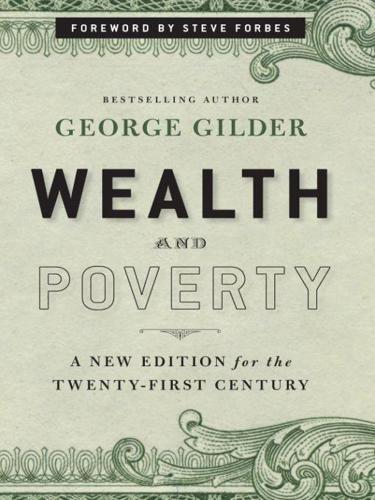
Wealth and Poverty: A New Edition for the Twenty-First Century
by
George Gilder
Published 30 Apr 1981
Most of the world, then as now, was engaged in one of its periodic revulsions against capitalist “greed” and waste. Lester Thurow of MIT was proclaiming a Zero-Sum Society, where henceforth any gains for the rich must be extracted from the poor and middle classes. William Sloane Coffin, the formidable Yale chaplain, was inveighing against capitalist orgies of greed and environmental devastation. Howard Zinn and Noam Chomsky were denouncing Western capitalism for displacing American Indians and condemning Israel for displacing Palestinians. Edward Said was conducting his Columbia classes (fatefully introducing the works of Frantz Fanon to future President Barack Obama) on Western psychological colonization and hegemonic evisceration of the entire Third World.
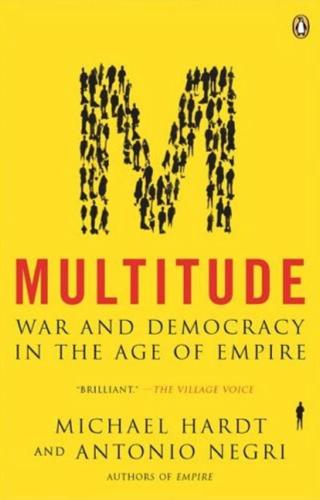
Multitude: War and Democracy in the Age of Empire
by
Michael Hardt
and
Antonio Negri
Published 1 Jan 2004
(Chapel Hill: University of North Carolina Press, 1959), 1: 168, 173. 31Jefferson’s Letters, ed. Willson Whitman (Eau Claire, WI: Hale and Company, nd), 83. David McCullough recounts Abigail Adams’s displeasure with Thomas Jefferson over Shays’ Rebellion in John Adams (New York: Touchstone, 2001), 368-71. For a brief, useful historial analysis of Shays’ Rebellion, see Howard Zinn, A People’s History of the United States (New York: HarperCollins, 1980), 92-93. 32 See Charles Beard, An Economic Interpretation of the Constitution of the United States (New York: Macmillan, 1914). 33 Karl Marx, Civil War in France: The Paris Commune (New York: International Publishers), 57-58. 34 Karl Marx, Civil War in France, 65; and Lenin, State and Revolution (New York: International Publishers, 1988), 37, 41. 35 On the experiences of the Russian Soviets, see Oskar Anweiler, Die Rätebewegung in Russland, 1905-1932 (Leiden, Holland: Brill, 1958).
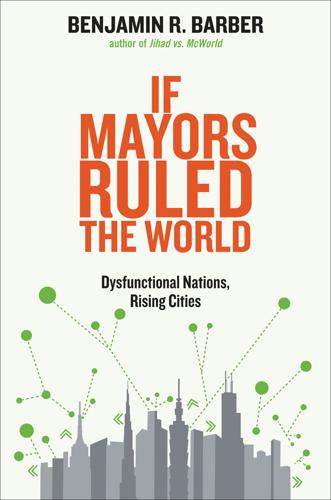
If Mayors Ruled the World: Dysfunctional Nations, Rising Cities
by
Benjamin R. Barber
Published 5 Nov 2013
Engerman, Time on the Cross: The Economics of American Negro Slavery, Boston: Little, Brown, 1974. More attention was given to its seeming exoneration of slavery, at least from an economic perspective, but its intention was more to underscore the powerful inequalities of urban capitalism. 23. For more on the “Southern Mystique,” see Howard Zinn, The Southern Mystique, Cambridge, MA: South End Press, 2002. 24. C. V. Wedgwood, ed., The Trial of Charles I, London: Folio Press: J. M. Dent, 1974, pp. 88–91. Profile 3. Boris Johnson of London 1. John F. Burns, “Athletes Arrive in London, and Run into a Dead End,” New York Times, July 14, 2012. 2. “105 Minutes with Boris Johnson,” interview with Carl Swanson, New York Magazine, June 17, 2012. 3.
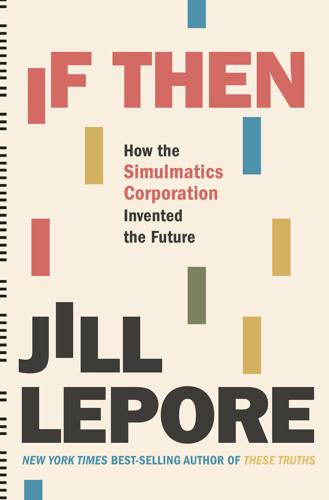
If Then: How Simulmatics Corporation Invented the Future
by
Jill Lepore
Published 14 Sep 2020
He had an extraordinary capacity to keep calm. He pointed out that students had been invited to the Project Cambridge planning meetings but none had ever shown up. He issued the invitation all over again.67 But he was overshadowed by the day’s other speakers: Noam Chomsky and the Boston University political scientist and activist Howard Zinn.68 In October, about 150 students demonstrated at MIT’s Center for International Studies, where both Ellsberg and Pool had offices. Demonstrators handed out leaflets that read, “Meet your local war criminal; come to the CIS.” Ellsberg had by now begun speaking against the war, allying himself with Chomsky and Zinn; secretly he was also engaged in the very dangerous work of trying to get the Pentagon Papers into the hands of the chair of the Senate Foreign Relations Committee, J.
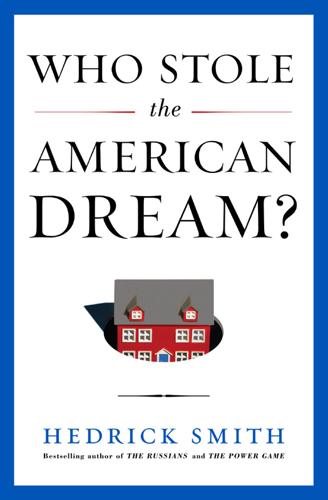
Who Stole the American Dream?
by
Hedrick Smith
Published 10 Sep 2012
Treasury Department, “Capital Gains and Taxes Paid on Capital Gains for Returns with Positive Net Capital Gains, 1954–2008,” http://www.ustreas.gov/offices/tax-policy/library/capgain1–2010.pdf. 36 Garner roughly half of all capital gains Robert Lenzner, “The Top 0.1% of the Nation Earn Half of All Capital Gains,” Forbes, November 20, 2011. 37 “If you make money with money” “Warren Buffett Tells Charlie Rose Why Congress Should Stop ‘Coddling’ the Super-Rich,” transcript, PBS, Charlie Rose, August 17, 2011, http://www.cnbc.com. 38 Personally, Buffett admitted Ibid.; and Warren Buffett, “Stop Coddling the Rich,” The New York Times, August 14, 2011. 39 The Forbes 400 Richest Americans Howard Zinn, A People’s History of the United States, 1492–Present (New York: HarperCollins, 1999), 580; see also Conor Dougherty, “Income Slides to 1996 Levels,” The Wall Street Journal, September 13, 2011; Census Bureau, “Income, Poverty, and Health Insurance Coverage in the United States: 2010.” 40 The Bush tax cuts Internal Revenue Service, U.S.
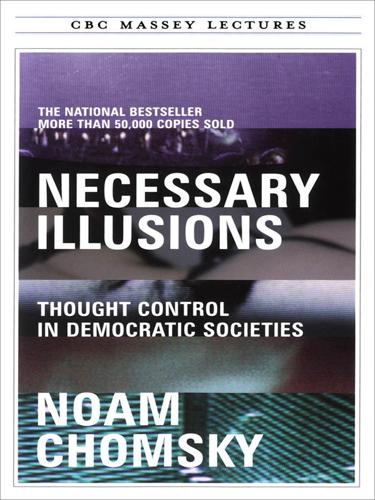
Necessary Illusions
by
Noam Chomsky
Published 1 Sep 1995
By the late 1960s, it was already clear that these were the basic factors behind the U.S. intervention in Southeast Asia, which, in U.S. global planning, was to be reconstituted as a “co-prosperity sphere” for Japan, within the U.S.-dominated Grand Area, while also serving as a market and source of raw materials and recycled dollars for the reconstruction of Western European capitalism. See my At War with Asia (Pantheon, 1970, introduction); For Reasons of State (Pantheon, 1973); Chomsky and Howard Zinn, eds., Critical Essays, vol. 5 of the Pentagon Papers (Beacon, 1972); and other work of the period. See also, among others, Borden, Pacific Alliance; Michael Schaller, The American Occupation of Japan (Oxford, 1985); Rotter, Path to Vietnam. 14. Acheson, Present at the Creation (Norton, 1969, 374, 489); Borden, op. cit, 44, 144. 15.

The Cold War: Stories From the Big Freeze
by
Bridget Kendall
Published 14 May 2017
This would lead to him deciding to testify at the Winter Soldier event organised by Vietnam Veterans Against the War. When I came home, I was very hostile to the anti-war movement. When I started college, people would wear black armbands to protest the war and I would wear my Marine Corps tropical shirt and I would bump into them and try to pick fights. Then I read a book [Vietnam: The Logic of Withdrawal by Howard Zinn (1967)], and when I learned the true history of Vietnam, about how we broke our word, it made me really angry, like, my country broke its word – I couldn’t believe it. They lied to us – I was really angry about that. Then the Pentagon Papers came out and I got to read that, about how much more lying the government did to us.
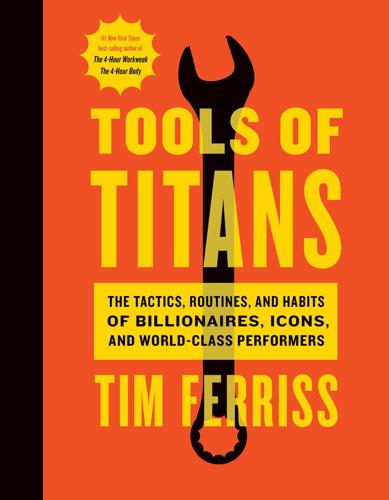
Tools of Titans: The Tactics, Routines, and Habits of Billionaires, Icons, and World-Class Performers
by
Timothy Ferriss
Published 6 Dec 2016
(Ron Chernow), How to Live: Or a Life of Montaigne in One Question and Twenty Attempts at an Answer (Sarah Bakewell), The Fish that Ate the Whale: The Life and Times of America’s Banana King; Tough Jews (Rich Cohen), Edison: A Biography (Matthew Josephson), Ulysses S. Grant: Triumph over Adversity (Brooks Simpson), Fahrenheit 451 (Ray Bradbury) Honnold, Alex: A People’s History of the United States (Howard Zinn), Sacred Economics: Money, Gift, and Society in the Age of Transition (Charles Eisenstein) Jarvis, Chase: Steal Like an Artist; Show Your Work! (Austin Kleon), The 22 Immutable Laws of Marketing (Al Ries and Jack Trout), Trust Me, I’m Lying: Confessions of a Media Manipulator (Ryan Holiday), The Rise of Superman (Steven Kotler), Daring Greatly (Brené Brown), Unlabel: Selling You Without Selling Out (Marc Eckō), Play It Away: A Workaholic’s Cure for Anxiety (Charlie Hoehn), Jab, Jab, Jab, Right Hook (Gary Vaynerchuk) John, Daymond: Think & Grow Rich (Napoleon Hill), Who Moved My Cheese?
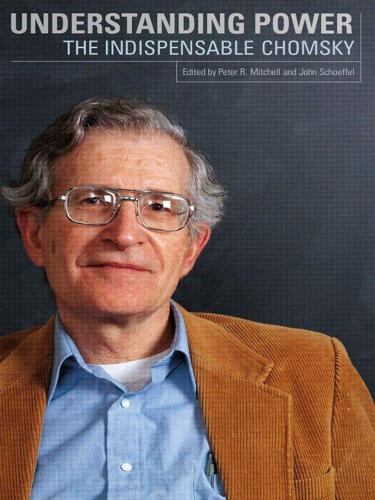
Understanding Power
by
Noam Chomsky
Published 26 Jul 2010
I mean, huge crowds come out to listen to your talks all around the country, those people might support something like that and want to begin getting involved with it. Well, it’s true about the audiences—but I don’t think that has to do with name-recognition or anything like that. See, there are only about ten people in the country, literally, who do this kind of thing—John Stockwell, Alex Cockburn, Dan Ellsberg, Howard Zinn, Holly Sklar, only a couple others—and we all get the same reaction. I think it’s just a matter of people all over the country being hungry to hear a different viewpoint. And what’s more, we all get the same reaction wherever we go—it’s the same in towns where nobody’s ever heard of me. Like, I was in central Michigan last week, they didn’t know who I was from Adam, but it was the same kind of crowd.

The Rough Guide to New York City
by
Rough Guides
Published 21 May 2018
Anyone can visit BLDG 92 to get acquainted with some Navy Yard history; a modular, energy-efficient glass structure is attached to an 1857 brick house originally built for the marine commandant and now a museum holding three floors’ worth of exhibitions. Linger over models of well-known ships built at the yard, including the USS Ohio, Maine and Missouri, and hear oral history from the likes of historian Howard Zinn, who worked at the yards in his youth. To appreciate what the place was, and what it’s become, it’s essential to take one of the fascinating tours. The most frequent of those, an overview called “Past, Present and Future” (others include World War II tours and kids’ detective tours), goes into great detail on the yard’s former military importance – an astonishing 71,000 people worked here during World War II – and its current redevelopment.
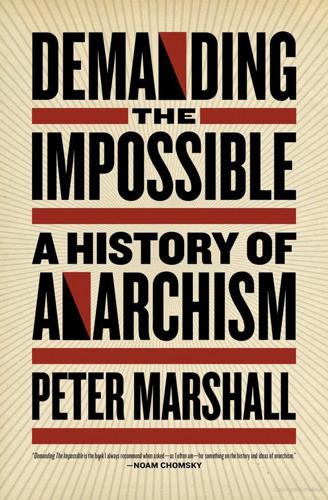
Demanding the Impossible: A History of Anarchism
by
Peter Marshall
Published 2 Jan 1992
—NAT HENTOFF, The Village Voice FOR ALL THE PEOPLE Uncovering the Hidden History of Cooperation, Cooperative Movements, and Communalism in America Paperback | 6″ × 9″ | 506 pages | $28.95 | ISBN: 978–1–60486–072–6 “It is indeed inspiring, in the face of all the misguided praise of ‘the market’, to be reminded by John Curl’s new book of the noble history of cooperative work in the United States.” —HOWARD ZINN, author of A People’s History of the United States The survival of indigenous communities and the first European settlers alike depended on a deeply cooperative style of living and working, based around common lands, shared food and labor. Cooperative movements proved integral to the grassroots organizations and struggles challenging the domination of unbridled capitalism in America’s formative years.
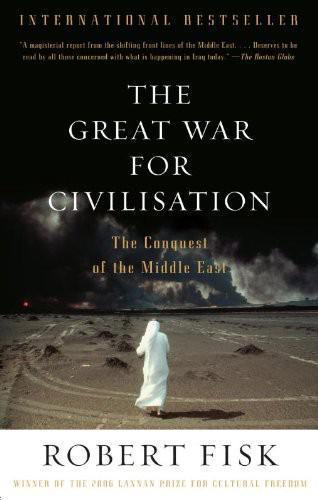
The Great War for Civilisation: The Conquest of the Middle East
by
Robert Fisk
Published 2 Jan 2005
All holders, of course, believe that “historians” must primarily decide the truth, an expression that precludes evidence from the dwindling survivors of the massacres. All this prompted 150 Holocaust scholars and historians to call upon Turkey to end its campaign of denial; they included Lifton, Israel Charny, Yehuda Bauer, Howard Zinn and Deborah Lipstadt. They failed. It was Elie Wiesel who first said that denial of genocide was a “double killing.” First the victims are slaughtered— and then their deaths are turned into a non-event, an “un-fact.” The dead die twice. The survivors suffer and are then told they did not suffer, that they are lying.

USA Travel Guide
by
Lonely, Planet
Earlier settlements had ended badly, and Jamestown almost did too: the English chose a swamp, planted their crops late and died from disease and starvation. Some despairing colonists ran off to live with the local tribes, who provided the settlement with enough aid to survive. If history is a partisan affair, Howard Zinn makes his allegiance clear in A People ’ s History of the United States (1980 & 2005), which tells the often-overlooked stories about laborers, minorities, immigrants, women and radicals. For Jamestown and America, 1619 proved a pivotal year: the colony established the House of Burgesses, a representative assembly of citizens to decide local laws, and it received its first boatload of 20 African slaves.